STANLEY KUBRICK'S BARRY LYNDON
Shot-by-Shot Analysis
Part One
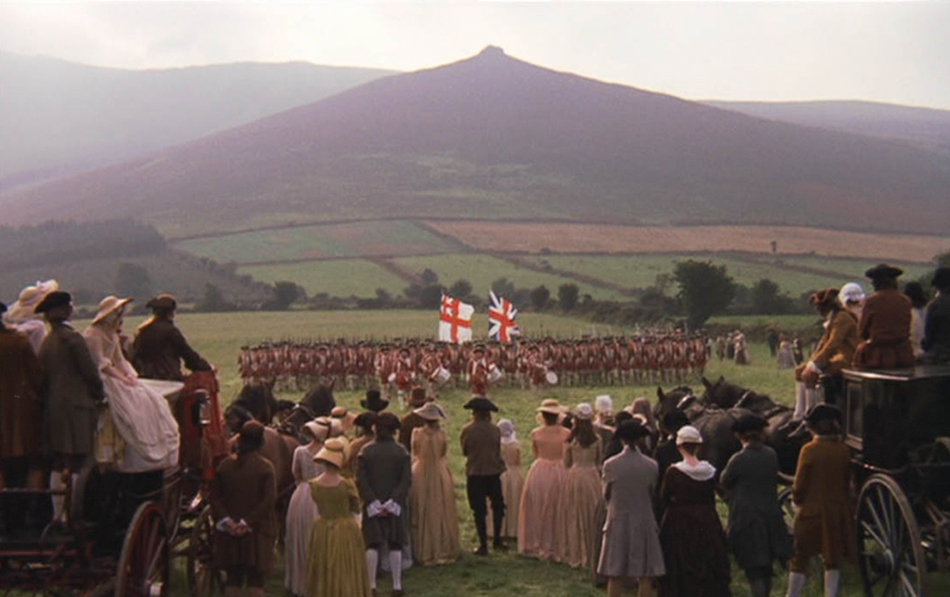
Go to TOC for this film ( (which has also a statement on purpose and manner of analysis and a disclaimer as to caveat emptor and my knowing anything authoritatively, which I do not, but I do try to not know earnestly, with some discretion, and considerable thought).
TOC and Supplemental Posts | Part 1 | Part 2 | Part 3 | Part 4 | Part 5 | Part 6 | Part 7 | Films Home
LINKS TO SECTIONS OF THE ANALYSIS ON THIS PAGE:
Credits, Shots 1 through 6
The First Duel, Shot 7
Notes on the First Duel.
Book versus film. Heightening the reality through the painterly effect. Cycles. The undulating waveform of the wall and fence.
Mrs. Barry Commits Her Life to Barry and the Memory of her Dead Husband, Shot 8
Notes on Mrs. Barry
Book versus film.
The Ribbon Game with Nora Brady, Shots 9 through 24
Notes on The Ribbon Game with Nora Brady. Book versus film. Nora as the older woman in the book. Location. The rose blows. The eight of hearts. Love story.
Captain Quin and the Regimental Review and Dance, Shots 25 through 40
Notes on Captain Quin and the Regimental Review and Dance. Book versus film.
The Pyramid and the False Barry at the Center of the Scene
The Piper's Maggot Jig, The Earworm and the Sarabande
Nora Caught Between the Affections of Barry and Quin, Shots 41 through 64
Notes on Nora Caught Between the Affections of Barry and Quin. Book versus film.
The Challenge, Shots 65 through 86
Notes on The Challenge. Book versus film.
The Second Walk Home, Shots 87 through 88
Notes on The Second Walk Home. Book versus film.
The Second Duel, Shots 89 through 110
Note on The Second Duel. Book versus film. For honor or love or what?
Barry Returns Home, as His Father Did Not, Only to Leave, Shots 111 through 118
Notes on Barry Returns Home, as His Father Did Not, Only to Leave. Book versus film. The shadow of doom.
1 - A WARNER COMMUNICATIONS COMPANY PRESENTS (00:00)
Credits begin with music, Handel's "Sarabande", composed about 1706.
2 A film by STANLEY KUBRICK (00:10)
3 starring RYAN O'NEAL (00:12)
4 and MARISA BERENSON (00:14)
5 BARRY LYNDON (00:18)
6 BY WHAT MEANS REDMOND BARRY ACQUIRED THE STYLE AND TITLE OF BARRY LYNDON (00:24)
Fade to black. The forceful orchestral version ends after a once through.
7 LS Two men preparing for duel in Irish countryside with 3 attendants standing between (00:37)
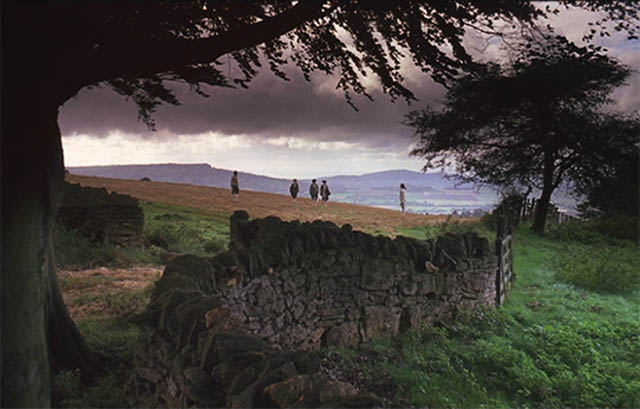
ONE OF THE MEN: Gentlemen, cock your pistols. Gentlemen...
NARRATION: Barry's father...
ONE OF THE MEN: ...aim your pistols...
NARRATION: ...being bred like many other young sons of a genteel family, to the profession of the law...
ONE OF THE MEN: One, and...
NARRATION:...and there is no doubt he would have made an eminent...
ONE OF THE MEN: ...two...
NARRATION: ...figure in his profession...
ONE OF THE MEN: ...three...
The man on the left fires first. As the man on the left fires next, he falls to the ground, having been struck.
NARRATION: ...had he not been killed in a duel, which arose over the purchase of some horses.
The three attendants run to gather around the man who has fallen to the ground.
The opening of Thackery's Lyndon is concerned first with Barry stressing the purported nobility of his lineage and how the Lyndon property into which he later married was actually family property.
The death of his father was touched upon lightly but had to do with gambling.
That very estate which the Lyndons now possess in Ireland was once the property of my race. Rory Barry of Barryogue owned it in Elizabeth's time, and half Munster beside. The Barry was always in feud with the O'Mahonys in those times; and, as it happened, a certain English colonel passed through the former's country with a body of men-at-arms, on the very day when the O'Mahonys had made an inroad upon our territories, and carried off a frightful plunder of our flocks and herds.
This young Englishman, whose name was Roger Lyndon, Linden, or Lyndaine, having been most hospitably received by the Barry, and finding him just on the point of carrying an inroad into the O'Mahonys' land, offered the aid of himself and his lances, and behaved himself so well, as it appeared, that the O'Mahonys were entirely overcome, all the Barrys' property restored, and with it, says the old chronicle, twice as much of the O'Mahonys' goods and cattle.
It was the setting in of the winter season, and the young soldier was pressed by the Barry not to quit his house of Barryogue, and remained there during several months, his men being quartered with Barry's own gallowglasses, man by man in the cottages round about. They conducted themselves, as is their wont, with the most intolerable insolence towards the Irish; so much so, that fights and murders continually ensued, and the people vowed to destroy them.
The Barry's son (from whom I descend) was as hostile to the English as any other man on his domain; and, as they would not go when bidden, he and his friends consulted together and determined on destroying these English to a man.
But they had let a woman into their plot, and this was the Barry's daughter. She was in love with the English Lyndon, and broke the whole secret to him; and the dastardly English prevented the just massacre of themselves by falling on the Irish, and destroying Phaudrig Barry, my ancestor, and many hundreds of his men. The cross at Barrycross near Carrignadihioul is the spot where the odious butchery took place.
Lyndon married the daughter of Roderick Barry, and claimed the estate which he left: and though the descendants of Phaudrig were alive, as indeed they are in my person,[Footnote: As we have never been able to find proofs of the marriage of my ancestor Phaudrig with his wife, I make no doubt that Lyndon destroyed the contract, and murdered the priest and witnesses of the marriage.—B. L.] on appealing to the English courts, the estate was awarded to the Englishman, as has ever been the case where English and Irish were concerned.
Thus, had it not been for the weakness of a woman, I should have been born to the possession of those very estates which afterwards came to me by merit, as you shall hear. But to proceed with my family, history.
My father was well known to the best circles in this kingdom, as in that of Ireland, under the name of Roaring Harry Barry. He was bred like many other young sons of genteel families to the profession of the law, being articled to a celebrated attorney of Sackville Street in the city of Dublin; and, from his great genius and aptitude for learning, there is no doubt he would have made an eminent figure in his profession, had not his social qualities, love of field-sports, and extraordinary graces of manner, marked him out for a higher sphere. While he was attorney's clerk he kept seven race-horses, and hunted regularly both with the Kildare and Wicklow hunts; and rode on his grey horse Endymion that famous match against Captain Punter, which is still remembered by lovers of the sport, and of which I caused a splendid picture to be made and hung over my dining-hall mantelpiece at Castle Lyndon. A year afterwards he had the honour of riding that very horse Endymion before his late Majesty King George II. at New-market, and won the plate there and the attention of the august sovereign.
Although he was only the second son of our family, my dear father came naturally into the estate (now miserably reduced to L400 a year); for my grandfather's eldest son Cornelius Barry (called the Chevalier Borgne, from a wound which he received in Germany) remained constant to the old religion in which our family was educated, and not only served abroad with credit, but against His Most Sacred Majesty George II. in the unhappy Scotch disturbances in '45. We shall hear more of the Chevalier hereafter.
For the conversion of my father I have to thank my dear mother, Miss Bell Brady, daughter of Ulysses Brady of Castle Brady, county Kerry, Esquire and J.P. She was the most beautiful woman of her day in Dublin, and universally called the Dasher there. Seeing her at the assembly, my father became passionately attached to her; but her soul was above marrying a Papist or an attorney's clerk; and so, for the love of her, the good old laws being then in force, my dear father slipped into my uncle Cornelius's shoes and took the family estate. Besides the force of my mother's bright eyes, several persons, and of the genteelest society too, contributed to this happy change; and I have often heard my mother laughingly tell the story of my father's recantation, which was solemnly pronounced at the tavern in the company of Sir Dick Ringwood, Lord Bagwig, Captain Punter, and two or three other young sparks of the town. Roaring Harry won 300 pieces that very night at faro, and laid the necessary information the next morning against his brother; but his conversion caused a coolness between him and my uncle Corney, who joined the rebels in consequence.
This great difficulty being settled, my Lord Bagwig lent my father his own yacht, then lying at the Pigeon House, and the handsome Bell Brady was induced to run away with him to England, although her parents were against the match, and her lovers (as I have heard her tell many thousands of times) were among the most numerous and the most wealthy in all the kingdom of Ireland. They were married at the Savoy, and my grandfather dying very soon, Harry Barry, Esquire, took possession of his paternal property and supported our illustrious name with credit in London. He pinked the famous Count Tiercelin behind Montague House, he was a member of 'White's,' and a frequenter of all the chocolate-houses; and my mother, likewise, made no small figure. At length, after his great day of triumph before His Sacred Majesty at Newmarket, Harry's fortune was just on the point of being made, for the gracious monarch promised to provide for him. But alas! he was taken in charge by another monarch, whose will have no delay or denial,—by Death, namely, who seized upon my father at Chester races, leaving me a helpless orphan. Peace be to his ashes! He was not faultless, and dissipated all our princely family property; but he was as brave a fellow as ever tossed a bumper or called a main, and he drove his coach-and-six like a man of fashion.
In Thackery's book, which was retained in Kubrick's early screenplay, we had the unreliable narrator telling his story directly, as had with Humbert in Lolita. Imagine Ryan O'Neal narrating for us--intolerable. With Barry no longer relating his history, portions retain their irony and sardonic humor, while one is removed from the super-personal to a more distant relationship.
That distant relationship between the viewer and the story is found also in Kubrick's gorgeous photography which famously reminds viewers of paintings. Kubrick did the same with the primate section of 2001, prehistory represented as if viewed in Smithsonian natural history displays, which actually aided in heightening the realism of the opening, as do Kubrick's painterly shots also heighten the realism of Barry's story by periodically distancing, which works by making the painting, which we expect to be static, breathe with life, a difficult feat to pull off without stumbling into kitsch. It's not too different in effect from once novel gifs that surprised with static computer images becoming active, and all that was needed was a brief second or two of movement for the viewer to have a sensation of augmented reality. Which is something else that happens with these painterly shots coming to life, we have that same sensation of an augmented and ultra-focused reality which is not had in the more personal, ordinary shots.
We are philosophically midway between the revivifications of Kubrick's earlier films and The Shining. One should return to the problem of the ghost camera, presented in A Clockwork Orange, which brings the past to life. and consider its relationship to Kubrick's approach to Barry Lyndon.
Thought I'd throw in here, for one of the great historical period piece films see Roberto Rosselini's 1966 The Taking of Power by King Louis XVI.
Kubrick works with cycles, and just as Barry Lyndon virtually begins and ends with a duel, so did Fear and Desire end with the same shot of a forest on which it had begun, and Lolita began and ended with Humbert hunting Quilty at the mansion where he was living.
Another cycle, unvoiced in the movie, is that in Thackery's book the Lyndon estate had once been in Barry's family. But then the prominent cycles of the duels in the movie do not occur the same way in the book. There is no crisis duel with Lord Bullingdon in the book: that circular story is Kubrick's own.
The undulating wave of the mountain is echoed in the waveform of the wall which transitions from stone to wooden fence. This is not only a beautiful shot, it expresses also a visual theme in Kubrick's films, that of the wave. Though we may have versions of it as early as The Killing, where it really begins to stand out is in Barry Lyndon, and is a strong element both in The Shining and Eyes Wide Shut.
8 MS A woman, carrying pink flowers, dressed in a blue and white striped dress. (01:21)
She crosses from left to right, before a stone and thatched roof building. The camera zooms out as she approaches a young man.
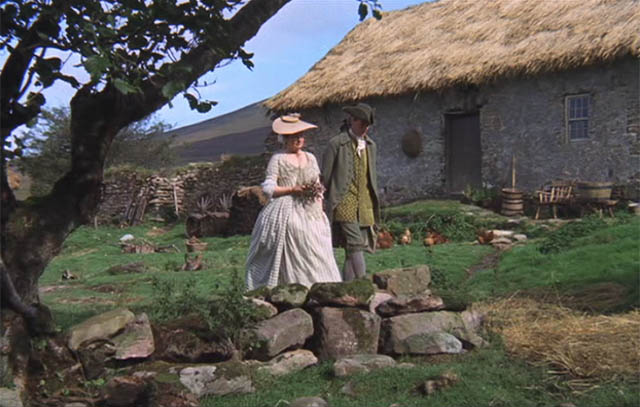
NARRATION: Barry's mother, after her husband's death, lived in such a way as to defy slander. Many a man, who had been smitten by the charms of the spinster, now renewed his offers to the widow, but she refused all proposals of marriage, declaring that she lived now for her son only, and the memory of her departed saint.
The two, strolling together, pass by a stone wall into an open field, a hay cart beyond, chickens strutting about.
The ominous and dark weight of the tree in the left of the frame of shot 7 shifts with our introduction to Barry's home, a tree also pinning down the left of the frame, but without the same foreboding. Nice.
Thackery represents Mrs. Barry in this way:
It must be confessed, very much to the discredit of Mrs. Brady of Castle Brady, that when her sister-in-law's poverty was thus made manifest, she forgot all the respect which she had been accustomed to pay her, instantly turned my maid and man-servant out of doors, and told Mrs. Barry that she might follow them as soon as she chose. Mrs. Mick was of a low family, and a sordid way of thinking; and after about a couple of years (during which she had saved almost all her little income) the widow complied with Madam Brady's desire. At the same time, giving way to a just though prudently dissimulated resentment, she made a vow that she would never enter the gates of Castle Brady while the lady of the house remained alive within them.
She fitted up her new abode with much economy and considerable taste, and never, for all her poverty, abated a jot of the dignity which was her due and which all the neighbourhood awarded to her. How, indeed, could they refuse respect to a lady who had lived in London, frequented the most fashionable society there, and had been presented (as she solemnly declared) at Court? These advantages gave her a right which seems to be pretty unsparingly exercised in Ireland by those natives who have it,—the right of looking down with scorn upon all persons who have not had the opportunity of quitting the mother-country and inhabiting England for a while. Thus, whenever Madam Brady appeared abroad in a new dress, her sister-in-law would say, 'Poor creature! how can it be expected that she should know anything of the fashion?' And though pleased to be called the handsome widow, as she was, Mrs. Barry was still better pleased to be called the English widow.
Mrs. Brady, for her part, was not slow to reply: she used to say that the defunct Barry was a bankrupt and a beggar; and as for the fashionable society which he saw, he saw it from my Lord Bagwig's side-table, whose flatterer and hanger-on he was known to be. Regarding Mrs. Barry, the lady of Castle Brady would make insinuations still more painful. However, why should we allude to these charges, or rake up private scandal of a hundred years old? It was in the reign of George II that the above-named personages lived and quarrelled; good or bad, handsome or ugly, rich or poor, they are all equal now; and do not the Sunday papers and the courts of law supply us every week with more novel and interesting slander?
At any rate, it must be allowed that Mrs. Barry, after her husband's death and her retirement, lived in such a way as to defy slander. For whereas Bell Brady had been the gayest girl in the whole county of Wexford, with half the bachelors at her feet, and plenty of smiles and encouragement for every one of them, Bell Barry adopted a dignified reserve that almost amounted to pomposity, and was as starch as any Quakeress. Many a man renewed his offers to the widow, who had been smitten by the charms of the spinster; but Mrs. Barry refused all offers of marriage, declaring that she lived now for her son only, and for the memory of her departed saint.
'Saint forsooth!' said ill-natured Mrs. Brady.
'Harry Barry was as big a sinner as ever was known; and 'tis notorious that he and Bell hated each other. If she won't marry now, depend on it, the artful woman has a husband in her eye for all that, and only waits until Lord Bagwig is a widower.'
Though Kubrick has given us none of this information, but for Mrs. Brady's said devotion to her departed saint, and her son, and despite not having the unreliable Barry relating the narration, the viewer senses that if we had more back story it might reveal a difference in affairs.
Kubrick's early screenplay instead had a scene of "Mrs. James" (Mrs. Brady) speaking with a suitor while "Roderick" (Barry) watched at a distance, he in narration relating that she refused offers of marriage, then followed with a shot of the mother and son walking together as "Roderick" told of his mother's pride in him, as had in the novel. Instead, the movie compresses these shots into one, so that as we watch we are uncertain whether Mrs. Barry is walking with a potential suitor or, indeed, her son. This is of some significance as the movie has a great deal to do with father figures and mother figures. Barry repeatedly loses his father figures but his mother is the one person who will later remain by his side.
9 MCU of a fountain topped with the figure of a child, water running over conchs and other shells. (02:07)
Sounds of thunder. Rain runs down the diamond panes of the glass enclosure as the camera zooms out. Violin music begins. Sean O Riada - Women of Ireland, The Chieftains. Barry sits on the left, playing cards with a young woman.
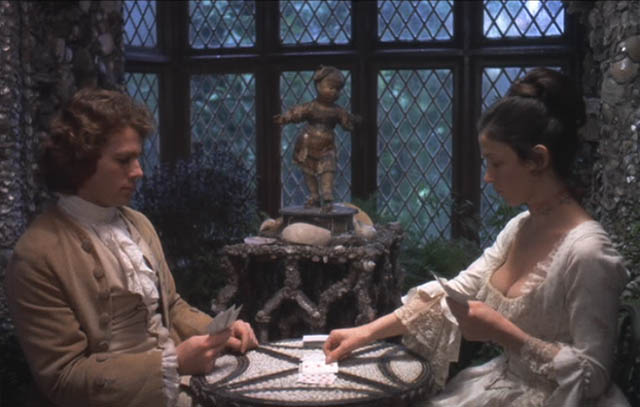
10 MS of Barry from over the woman's left shoulder. A stained glass window is in the background. She places down a 8 of hearts and picks up a 5 of diamonds. (02:51)
NARRATION: First love. What a change it makes in a lad. What a magnificent...
11 MS of woman from beyond Barry's right shoulder. We see his hand. 7 of diamonds, 2 of clubs, 2 of hearts. He places down his 2 of clubs and picks up an 8 of hearts. (03:01)
NARRATION: ...secret it is that he carries about with him. The tender passion gushes instinctively out of a man's heart. He loves as a bird sings, or a rose blows...
12 CU of woman. (03:14)
NARRATION: ...from nature.
WOMAN: Killarney. Now, what shall it be?
13 MS Barry from over the woman's shoulder. (3:26)
WOMAN: Turn around and face the wall.
He turns. She lifts her hands to undo her choker.
14 CU of woman undoing her choker. (03:37)
NARRATION: The object of Barry's attention, and...
15 MS of Barry and Nora at the table, he facing away from her. (03:41)
NARRATION: ...the cause of all his early troubles, was his cousin, Nora Brady, by name.
She hides the ribbon in her bodice. She rises and crosses to stand before him.
NORA: I have taken the ribbon from around my neck and hidden it somewhere on my person.
16 CU Nora with the orange diamond of the stained glass window screen left. (04:03)
NORA: If you find it, you can have it. You are free to look for it any way you will, and I will think very little of you if you do not find it.
She raises her eyes and waits.
17 CU Soft focus of Barry seated before Nora's bosom. (04:15)
He parts her hands first.
BARRY: I cannot find it.
18 CU of Nora. (04:40)
NORA: You haven't looked properly.
19 CU Soft focus of Barry before Nora's bosom. (04:45)
BARRY: I cannot find it.
20 CU of Nora. (05:00)
NORA: I'll give you a hint.
21 CU soft focus of Barry before Nora's bosom. (05:07)
She raises his hand to her bosom.
BARRY: I feel the ribbon.
22 CU of Nora. (05:26)
NORA: Why are you trembling?
23 CU of Barry before Nora's bosom. (05:32)
BARRY (pulling out the ribbon): I...I have the pleasure of finding the ribbon.
24 CU of Nora. (05:42)
NORA: You're a liar.
The camera pans down as she leans down to kiss Barry.
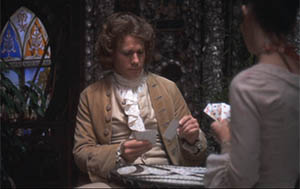 10 |
 11 |
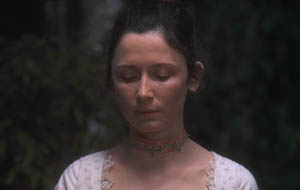 12 |
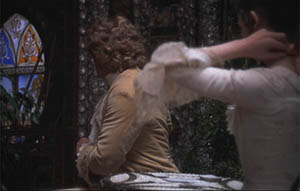 13 |
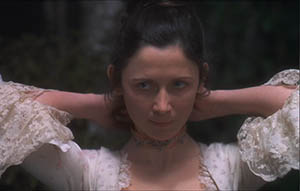 14 |
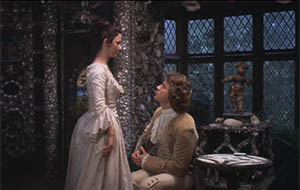 15 |
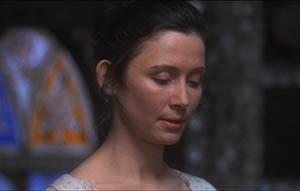 16 |
 17 |
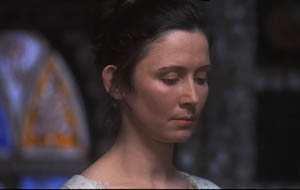 18 |
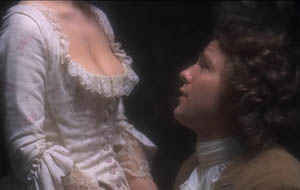 19 |
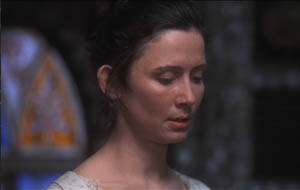 20 |
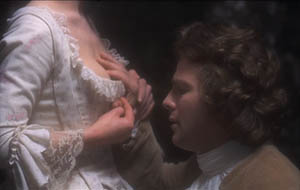 21 |
 22 |
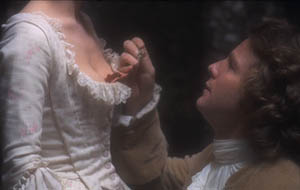 23 |
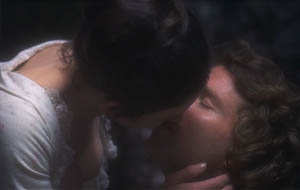 24 |
|
Kubrick's original screenplay introduces the Bradys, and Nora, with shots of a picnic, the rundown estate, and "Dorothy" (Nora) suggested as applying her charms liberally as she is caught in numerous shots speaking with different men and boys and Barry fighting at least one of them. We then have a scene in which, during a chase in the woods, "Dorothy" involves Barry in the game of the ribbon, during which he searches not only her bodice but her legs and armpits.
There is no such event in Thackery's book, and Nora is not the same as depicted in the movie, at least not physically.
I have made acquaintance with the best in the land since, and my manners are such, I have said, as to make me the equal of them all; and, perhaps, you will wonder how a country boy, as I was, educated amongst Irish squires, and their dependants of the stable and farm, should arrive at possessing such elegant manners as I was indisputably allowed to have. I had, the fact is, a very valuable instructor in the person of an old gamekeeper, who had served the French king at Fontenoy, and who taught me the dances and customs, and a smattering of the language of that country, with the use of the sword, both small and broad. Many and many a long mile I have trudged by his side as a lad, he telling me wonderful stories of the French king, and the Irish brigade, and Marshal Saxe, and the opera-dancers; he knew my uncle, too, the Chevalier Borgne, and indeed had a thousand accomplishments which he taught me in secret. I never knew a man like him for making or throwing a fly, for physicking a horse, or breaking, or choosing one; he taught me manly sports, from birds'-nesting upwards, and I always shall consider Phil Purcell as the very best tutor I could have had. His fault was drink, but for that I have always had a blind eye; and he hated my cousin Mick like poison; but I could excuse him that too.
With Phil, and at the age of fifteen, I was a more accomplished man than either of my cousins; and I think Nature had been also more bountiful to me in the matter of person. Some of the Castle Brady girls (as you shall hear presently) adored me. At fairs and races many of the prettiest lasses present said they would like to have me for their bachelor; and yet somehow, it must be confessed, I was not popular.
In the first place, every one knew I was bitter poor; and I think, perhaps, it was my good mother's fault that I was bitter proud too. I had a habit of boasting in company of my birth, and the splendour of my carriages, gardens, cellars, and domestics, and this before people who were perfectly aware of my real circumstances. If it was boys, and they ventured to sneer, I would beat them, or die for it; and many's the time I've been brought home well-nigh killed by one or more of them, on what, when my mother asked me, I would say was 'a family quarrel.' 'Support your name with your blood, Reddy my boy,' would that saint say, with the tears in her eyes; and so would she herself have done with her voice, ay, and her teeth and nails.
Thus, at fifteen, there was scarce a lad of twenty, for half-a-dozen miles round, that I had not beat for one cause or other. There were the vicar's two sons of Castle Brady—in course I could not associate with such beggarly brats as them, and many a battle did we have as to who should take the wall in Brady's Town; there was Pat Lurgan, the blacksmith's son, who had the better of me four times before we came to the crowning fight, when I overcame him; and I could mention a score more of my deeds of prowess in that way, but that fisticuff facts are dull subjects to talk of, and to discuss before high-bred gentlemen and ladies.
However, there is another subject, ladies, on which I must discourse, and THAT is never out of place. Day and night you like to hear of it: young and old, you dream and think of it. Handsome and ugly (and, faith, before fifty, I never saw such a thing as a plain woman), it's the subject next to the hearts of all of you; and I think you guess my riddle without more trouble. LOVE! sure the word is formed on purpose out of the prettiest soft vowels and consonants in the language, and he or she who does not care to read about it is not worth a fig, to my thinking.
My uncle's family consisted of ten children; who, as is the custom in such large families, were divided into two camps, or parties; the one siding with their mamma, the other taking the part of my uncle in all the numerous quarrels which arose between that gentleman and his lady. Mrs. Brady's faction was headed by Mick, the eldest son, who hated me so, and disliked his father for keeping him out of his property: while Ulick, the second brother, was his father's own boy; and, in revenge, Master Mick was desperately afraid of him. I need not mention the girls' names; I had plague enough with them in after-life, Heaven knows; and one of them was the cause of all my early troubles: this was (though to be sure all her sisters denied it) the belle of the family, Miss Honoria Brady by name.
She said she was only nineteen at the time; but I could read the fly-leaf in the family Bible as well as another (it was one of the three books which, with the backgammon-board, formed my uncle's library), and know that she was born in the year '37, and christened by Doctor Swift, Dean of St. Patrick's, Dublin: hence she was three-and-twenty years old at the time she and I were so much together.
When I come to think about her now, I know she never could have been handsome; for her figure was rather of the fattest, and her mouth of the widest; she was freckled over like a partridge's egg, and her hair was the colour of a certain vegetable which we eat with boiled beef, to use the mildest term. Often and often would my dear mother make these remarks concerning her; but I did not believe them then, and somehow had gotten to think Honoria an angelical being, far above all the other angels of her sex.
A game involving the ribbon existed to the extent that, in the book, Barry later reveals ribbons that Nora has given him as gifts, which offends Quin who has also received such gifts. How they were received is not stated.
Thackeray's description reveals that Nora was perhaps somewhat homely. And that Barry was a bully, stressed by his poverty and feeling himself more suited to nobility. He also eschewed attempts to formally educate him.
So Barry, in the book, is not as innocent as Kubrick represents him. Except for his innocence over Nora, which reminds us a little of Lolita. For Nora was eight years older than him. He was only fifteen. She was twenty-three. He's told she is old enough "to be his mother" when he defies her marriage to Quin. Though this isn't the case, eight years separation between the two is a significant gap for a fifteen-year-old. In the novel, no one saw Nora Brady as any kind of a suitable match for Barry and esteemed him as only being a fool in his love for her. No one saw Nora as any kind of a suitable match for Quin, who had come from outside the village, was unfamiliar with her reputation, and who had money.
Barry was only fifteen and Nora was eight years his elder. This is sexual abuse and Kubrick makes an attempt, I think, at representing it as such, but it's difficult to do with a manly O'Neal. The age difference, however, accounts for his timidity in contrast with Nora's power play. He's unprepared, he's a child, just as in The Shining Kubrick refers to the same predicament of a young adolescent who becomes involved with an older woman in The Summer of 42.
The scene of Barry's love affair with Nora is presided over by a dancing child figure, perhaps recalling the movie's opening with a dance, the Sarabande, and reminds one of a cupid, especially as they are in a room built of shells, conchs used as decoration, and Aphrodite appeared in the waves carried to shore by the raft of a seashell. The place is known as Shell Cottage which was built for an Emily Lennox, daughter of the Duke of Richmond, who married James Fitzgerald, 20th Earl of Kildaire and a resident at Carton House. Emily decorated the walls with shells and other examples of marine life brought to her from around the world. A child of theirs was Lord Fitzgerald, leader of the 1798 rebellion.
The "rose blows" line comes from a poem that Barry wrote for Nora.
THE ROSE OF FLORA.
Sent by a Young Gentleman of Quality to Miss Brady, of Castle Brady.
On Brady's tower there grows a flower,
It is the loveliest flower that blows,—
At Castle Brady there lives a lady
(And how I love her no one knows):
Her name is Nora, and the goddess Flora
Presents her with this blooming rose.
'O Lady Nora,' says the goddess Flora,
'I've many a rich and bright parterre;
In Brady's towers there's seven more flowers,
But you're the fairest lady there:
Not all the county, nor Ireland's bounty,
Can projuice a treasure that's half so fair!
What cheek is redder? sure roses fed her!
Her hair is maregolds, and her eye of blew
Beneath her eyelid is like the vi'let,
That darkly glistens with gentle jew?
The lily's nature is not surely whiter
Than Nora's neck is,—and her arrums too.
'Come, gentle Nora,' says the goddess Flora,
'My dearest creature, take my advice,
There is a poet, full well you know it,
Who spends his lifetime in heavy sighs,—
Young Redmond Barry, 'tis him you'll marry,
If rhyme and raisin you'd choose likewise.'
The 8 of hearts, discarded by Nora, picked up by Barry in shots 10 and 11, says something about what is about to happen to Barry. Wikipedia states, "This indicates changes in affections and the breaking of irrelevant links with the past - a turning away from existing relationships and objects of affection with the intent of progressing to that which is new and deeper in meaning. A change or gaining of perspective, this can indicate disillusion with the present, inaugurating the growth of greater future contentment and depth. This card usually carries the meaning of disillusionment and abandonment of things which have not been emotionally fulfilling."
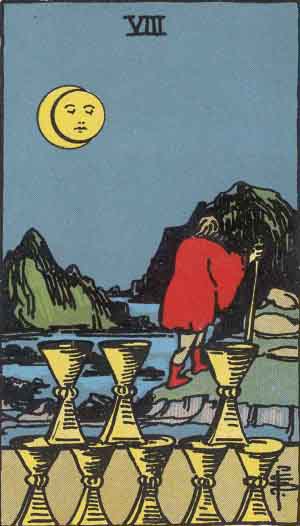
The above is the Waite version. The Crowley version below reminds of the same green that accompanies the young woman in room 237.
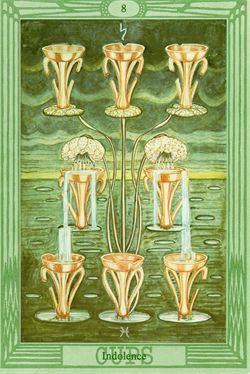
The way Kubrick presents it is that Barry's heart is indeed broken by the elder and more worldly Nora. He at first takes love quite seriously, but is instructed by society and family that what matters more than heartfelt love is money and status.
Coincidentally, Gay Hamilton, who plays Nora, was in a UK television series called Love Story that ran from the early 60s into the 70s. And, of course, what launched Ryan O'Neal's fame was the unrelated film, Love Story, in which he was a rich boy in love with a poor girl who tragically dies in the way that they-must-pay-for-their-unsanctioned-love movies must have sacrifice.
25 LS of Men in military garb. (06:01)
OFFICER: Company, forward, march!
The drummers begin to play, which reminds of the thunder in the last scene. The music is British Grenadiers Fifes and Drums. The camera zooms out as the men continue marching forward, pulling back until we have a view of civilians standing with their backs to the camera, watching, and the fields beyond.
26 MLS side view of officer. (05:51)
OFFICER: (Says something I don't begin to understand.)
The officer raises his sword then points it down and to one side as he looks in the opposite direction.
NARRATION: About this time, the United Kingdom was in a state of great excitement, from the threat, generally accredited...
27 MLS from the side of soldiers marching. (07:08)
NARRATION: ...to the French invasion. And the noblemen, and people of condition, showed their loyalty by raising regiments of horse and foot...
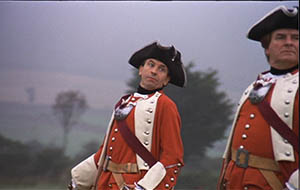 26 |
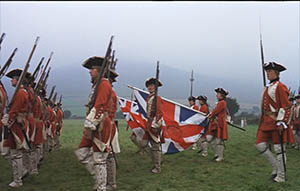 27 |
28 LS of Barry Lyndon and Nora standing in the group of civilians. The camera zooms in. (07:19)
NARRATION: ...to resist the invaders. Their scarlet coats and swaggering airs filled Barry with envy.
29 LS of the soldiers now marching left to right, from beyond civilian carriages. (07:32)
OFFICER: (Again, he shouts something I don't begin to understand.)
The gesture is repeated of raising the swords to the nose and then pointing them to the ground, this time to their right and they also looking to their right, to the civilians.
NARRATION: Bradytown sent a company to join the...
30 MS of Officer. (07:52)
NARRATION: ...Kilwangan regiment, of which John Quin was the captain. The whole country was alive with war's alarms...
31 CU of Nora watching smitten. (08:03)
NARRATION: ...the three kingdoms ringing with military music.
32 LS from behind the civilians of them watching the militia. (08:08)
QUIN: Make ready!
33 MS from right of Quin and company as the font line kneels. (08:17)
QUIN: (Yells something else I don't understand.)
All raise their rifles.
34 LS from behind of the civilians watching as the militia fires. (08:24)
QUIN: Fire!
The rifles fire and people yell at the noise.
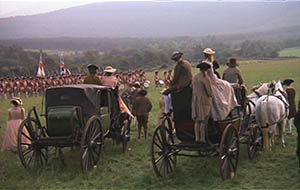 29 |
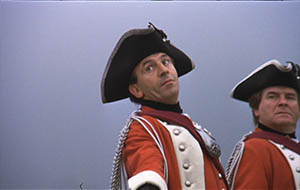 30 |
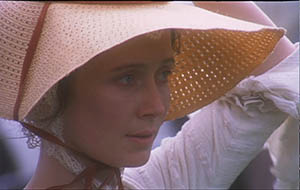 31 |
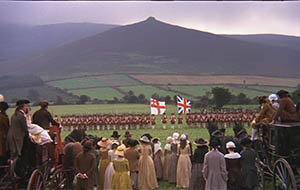 32 |
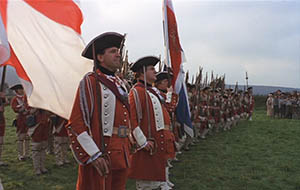 33 |
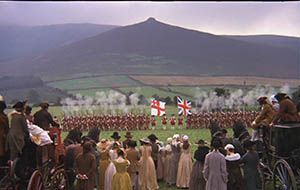 34 |
35 MS Quin and Nora dance to Piper's Maggot Jig. (08:25)
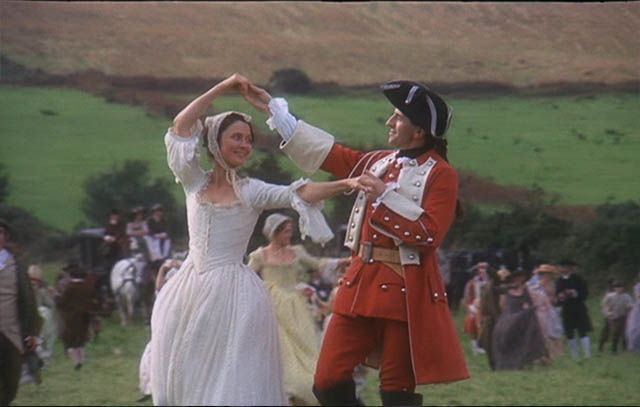
36 MS of Barry watching the pair dancing. (09:07)
37 LS of Quin and Nora dancing. (09:16)
38 MCU of Quin standing beside Nora, watching as she dances. (09:39)
They then join hands and dance together, exultant.
39 CU of Barry watching, despondent. (09:47)
 36 |
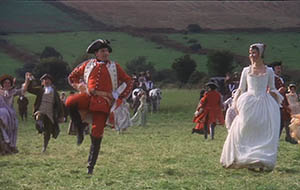 37 |
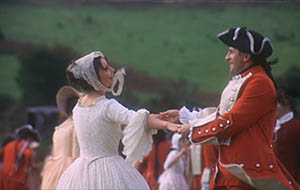 38 |
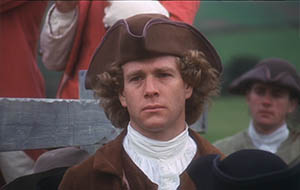 39 |
40 LS of Barry walking Nora down the road. (09:53)
Return to the music, Sean O Riada - Women of Ireland, The Chieftains.
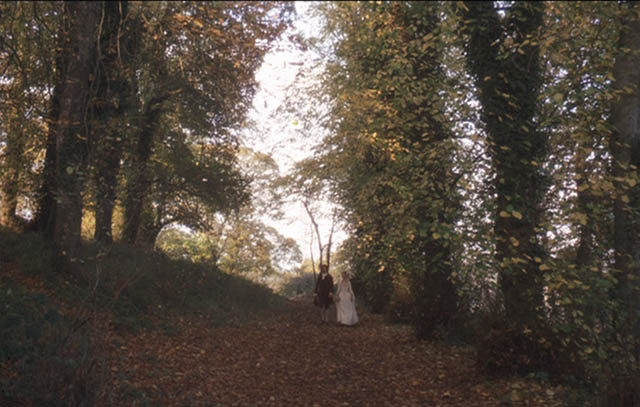
NORA: Redmond, what is the matter?
BARRY: Nora, were you obliged to dance five times with Captain Quin?
NORA: I don't care a fig for Captain Quin. He dances prettily, to be sure, and is a pleasant rattle of a man, and he looks fine in his regimentals, too. If he chose to ask me to dance, how could I refuse him?
BARRY: But you refused me.
NORA: Oh, I can dance with you any day. And to dance with your own cousin looks as though you could find no other partner. Besides, Redmond, Captain Quin is a man, and you're only a boy and haven't a guinea in the world.
BARRY: If ever I should meet him again you will find out who is the best man of the two. I'll fight him sword or pistol, Captain as he is.
NORA: Redmond, don't be so silly.
BARRY: I mean it, Nora.
NORA: But Captain Quin is already known as a valiant soldier. It might do well of you to fight farmer's boys, but to fight an Englishman is a very different matter.
BARRY: Best have your Englishman take you home.
Barry walks off screen left past the camera.
NORA: Redmond.
She turns around and goes back up the path.
Kubrick's early screenplay has the military review followed by a ball, then Barry taking Nora home on horseback and their conversation playing out pretty much as it does in its present state, though Barry does not leave Nora on the road.Thackery has also Barry's jealousy over the splendor of the military followed by the ball where Nora refuses to dance with him.
About this time, it must be premised, the United Kingdom was in a state of great excitement from the threat generally credited of a French invasion. The Pretender was said to be in high favour at Versailles, a descent upon Ireland was especially looked to, and the noblemen and people of condition in that and all other parts of the kingdom showed their loyalty by raising regiments of horse and foot to resist the invaders. Brady's Town sent a company to join the Kilwangan regiment, of which Master Mick was the captain; and we had a letter from Master Ulick at Trinity College, stating that the University had also formed a regiment, in which he had the honour to be a corporal. How I envied them both! especially that odious Mick as I saw him in his laced scarlet coat, with a ribbon in his hat, march off at the head of his men. He, the poor spiritless creature, was a captain, and I nothing,—I who felt I had as much courage as the Duke of Cumberland himself, and felt, too, that a red jacket would mightily become me! My mother said I was too young to join the new regiment; but the fact was, that it was she herself who was too poor, for the cost of a new uniform would have swallowed up half her year's income, and she would only have her boy appear in a way suitable to his birth, riding the finest of racers, dressed in the best of clothes, and keeping the genteelest of company.
Well, then, the whole country was alive with war's alarums, the three kingdoms ringing with military music, and every man of merit paying his devoirs at the court of Bellona, whilst poor I was obliged to stay at home in my fustian jacket and sigh for fame in secret. Mr. Mick came to and fro from the regiment, and brought numerous of his comrades with him. Their costume and swaggering airs filled me with grief, and Miss Nora's unvarying attentions to them served to make me half wild. No one, however, thought of attributing this sadness to the young lady's score, but rather to my disappointment at not being allowed to join the military profession.
Once the officers of the Fencibles gave a grand ball at Kilwangan, to which, as a matter of course, all the ladies of Castle Brady (and a pretty ugly coachful they were) were invited. I knew to what tortures the odious little flirt of a Nora would put me with her eternal coquetries with the officers...
...
...'Were you obliged to dance five times with Captain Quin?' said I; and oh! strange delicious charm of coquetry, I do believe Miss Nora Brady at twenty-three years of age felt a pang of delight in thinking that she had so much power over a guileless lad of fifteen. Of course she replied that she did not care a fig for Captain Quin: that he danced prettily, to be sure, and was a pleasant rattle of a man; that he looked well in his regimentals too; and if he chose to ask her to dance, how could she refuse him?
'But you refused me, Nora.'
'Oh! I can dance with you any day,' answered Miss Nora, with a toss of her head; 'and to dance with your cousin at a ball, looks as if you could find no other partner. Besides,' said Nora—and this was a cruel, unkind cut, which showed what a power she had over me, and how mercilessly she used it,—'besides, Redmond, Captain Quin's a man and you are only a boy!'
'If ever I meet him again,' I roared out with an oath, 'you shall see which is the best man of the two. I'll fight him with sword or with pistol, captain as he is. A man indeed! I'll fight any man—every man! Didn't I stand up to Mick Brady when I was eleven years old?—Didn't I beat Tom Sullivan, the great hulking brute, who is nineteen?—Didn't I do for the Scotch usher? O Nora, it's cruel of you to sneer at me so!'
But Nora was in the sneering mood that night, and pursued her sarcasms; she pointed out that Captain Quin was already known as a valiant soldier, famous as a man of fashion in London, and that it was mighty well of Redmond to talk and boast of beating ushers and farmers' boys, but to fight an Englishman was a very different matter.
Barry is devastated by the magnetic glory of the military and his respective lack of power, as is made clear in shot 39.
Let's look at shot 25, which will recall for many Kubrick's prison yard shot in A Clockwork Orange with its explicit pyramid, which is repeated throughout Kubrick's work but is there highlighted boldly.
Shot 25 is an interesting one for a couple of reasons, for the pyramid is subtly repeated several times, forcing one's eye toward the center--an example of single point perspective that doesn't hijack the scene.
Not only do we have the pyramid at the top, we have the smaller pyramid at the bottom, at the apex of which stands this interesting figure in black and brown with knee bent to the side. The two carriages and their lines force our eye to the center as well. The bent knee. The short jacket. The awkwardness and asymmetry of the central figure, the feeling that the hat doesn't fit quite right, and the jacket's too small. Our attention is held by this figure in the center, standing opposite Quin, the flags and their X's to either side so we have a mirroring quality.
The expectancy and emotional impression is that this should be Barry with Nora standing beside him, as we see in the opposing shot 28 which has Barry standing there with his knee bent out and a diminutive girl standing to his right (screen left) which is anticipated by shot
25. Barry's arms are hidden behind his back in shot 28, whereas in shot 25 they are hidden before the figure, but another connection is had through the very fact they are hidden. We don't see so much *how* the arms are hidden but that they are hidden.
So, shot 28 tells us what we believe we should be seeing in shot 25, that Barry is the central figure, but shot 25 is actually quite different. Barry is not the central figure of interest. Barry is instead the figure pointed out by my red arrow, standing off to screen left. He's easily identifiable by not only the cut of his coat but his shoulders and how those shoulders shape his clothing in a different way from the other men. Then in shots 32 and 34 that central figure in the short coat is missing, he has been pushed to the left and almost completely out of view (especially in shot 32) while Barry remains over on the left.
The question is, why is Barry not the central focus of this shot? The answer should say something about the manner in which the movie is filmed, about the story of Barry Lyndon, his real relationship to it and our relationship to it.
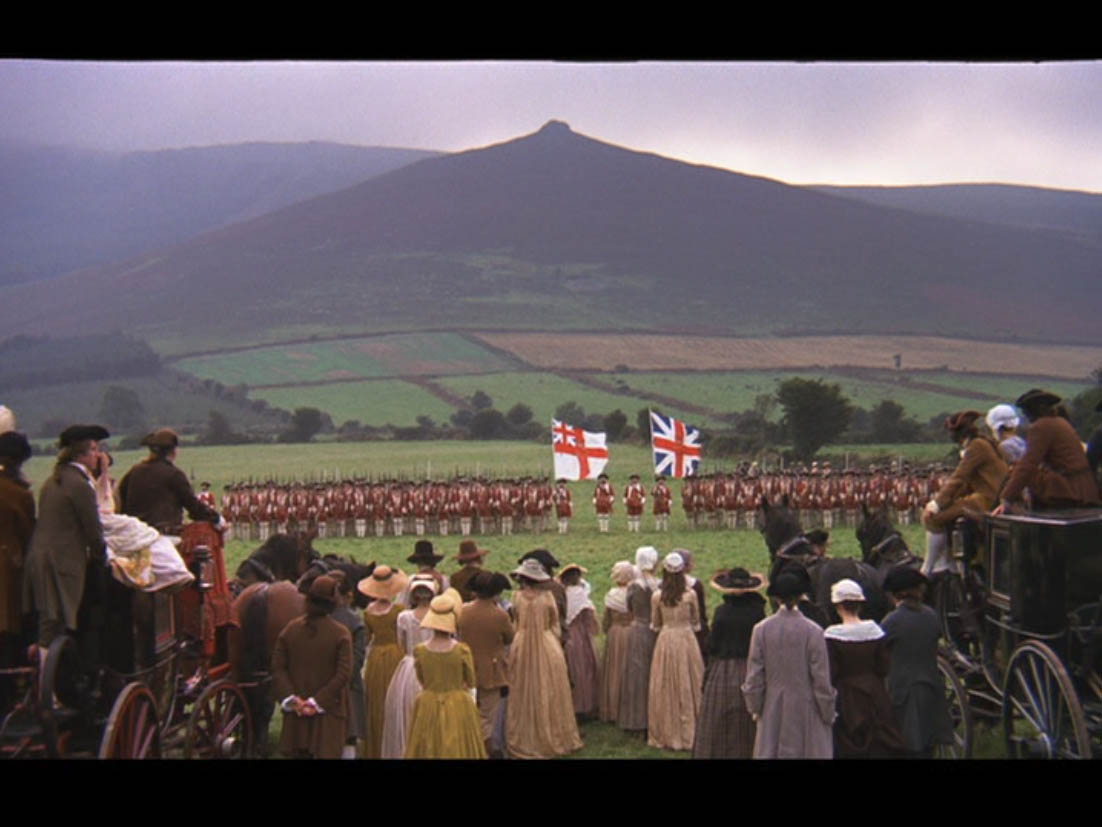
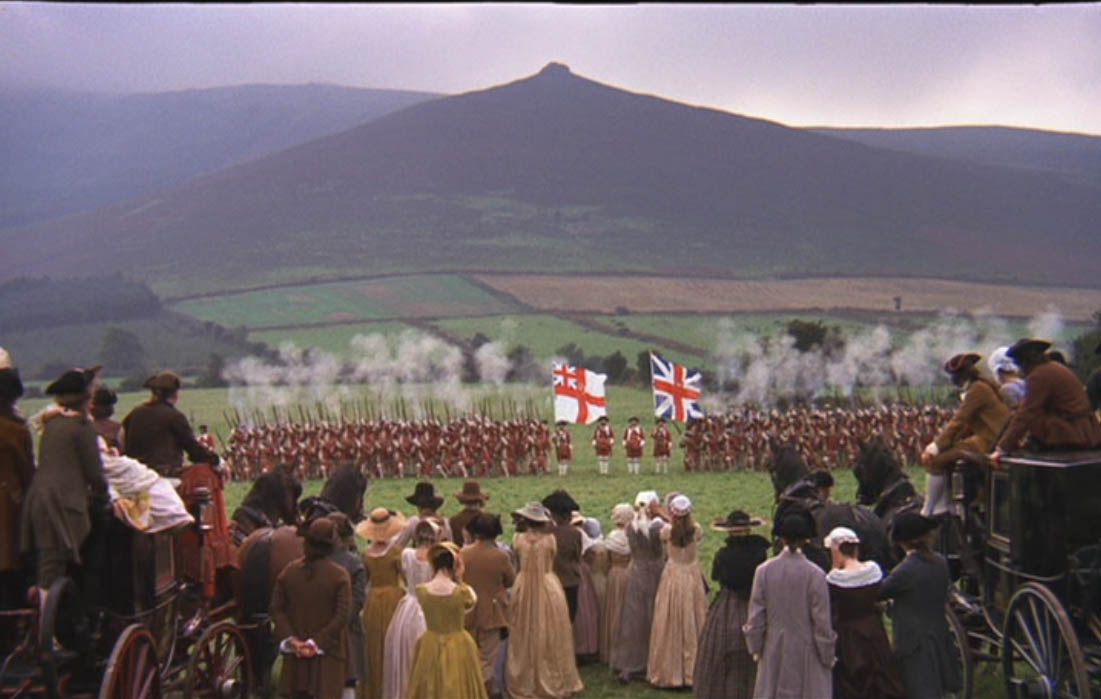
I'll examine this pyramid later in respect to A Clockwork Orange but not now. I'll take another look at it during the boxing scene.
This ball introduces the dance of the piper's maggot which could be said to be much like what is today called an earworm. A loop that will not release one.
Though beautifully done, Kubrick's use of music in the film is designed to play as earworms, in particular Handel's Sarabande. We hear it in the opening credits, then later during the duel with Quin and when Barry returns home from the duel. It will return when he is teaching Bryan to fence in shot 647 and with a few interruptions will continue through the most tragic scenes of Barry's life until shot 768 when, Barry recuperating after his duel with Bullingdon, Graham arrives at the inn with the news of Barry's absolute severance from Lady Lyndon but for a yearly annuity.
Wikipedia notes that the sarabande, a spanish dance, is "the third of the four basic dances and is one of the slowest...It is also in triple meter and can start on any beat of the bar, although there is an emphasis on the second beat, creating the characteristic 'halting', or iambic rhythm of the sarabande." With the Handel in the film we have repeated over and over da DUM / da da DUM. This is described by some as a victorious, majestic movement forward, and that it plays through the worst of Barry's tragedies makes them even more powerful in their progression, both a humane and yet relentless accompaniment. We could even look back to the statue of the dancing child in the ribbon game scene between Barry and Nora and see in it the opening steps of the forward courante.
41 MLS Barry chopping wood. The camera zooms out for a long shot. (11:34)
NARRATION: Barry had resolved never to see Nora again. But such resolutions, though they may be steadfastly hold for a whole week, are abandoned in a few moments of bleak despair.
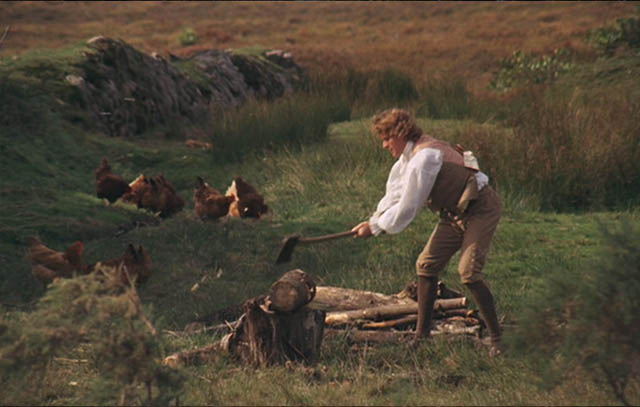
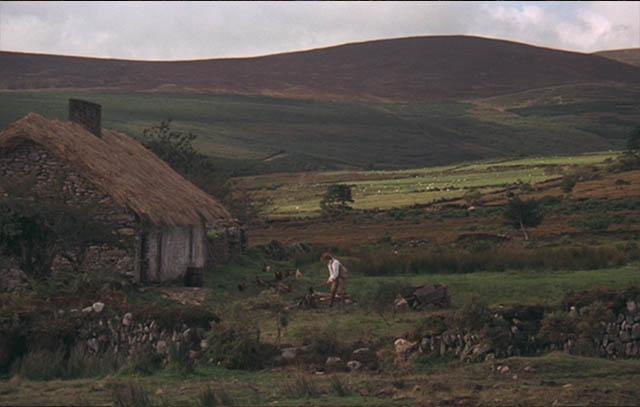
42 MCU of Quin holding Nora's hand. Zoom out and pan up to show also their faces as they speak. (12:07)
QUIN: No, Nora, no. Except for you, and four others, I vow before all the gods, my heart has never felt the soft flame.
NORA: Ah, you men. You men, John.
The camera continues again to zoom out showing the hillside.
NORA:
Your passion's not equal to ours. Our love is like some plant I've read of. We bear but one flower and then we die.
QUIN: You, you mean you never felt such an inclination for another?
NORA: Never, my John, but for thee. How can you ask me such question?
QUIN (grasps her other hand): I love you. (Or something such as this, I can't tell.)
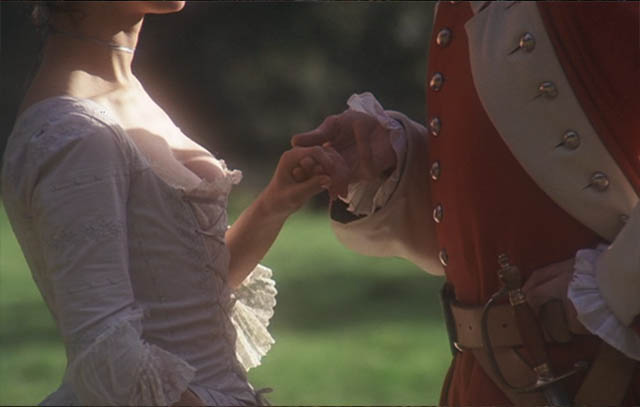
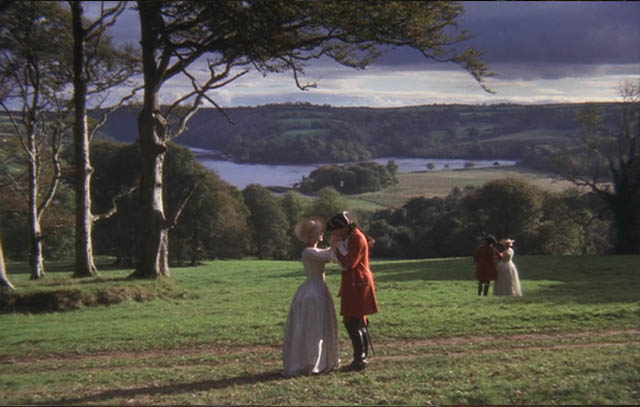
43 MLS of two men standing to the left of the scene before a castle. (12:48)
Barry enters right, in the distance, as the narration continues. I read the location is Huntingdon Castle and that's the river Derry.
NARRATION: Nora was chaperoned by her brothers, Mick and Ulick, whose interests would be much affected by the favorable outcome of her affair with Captain Quin.
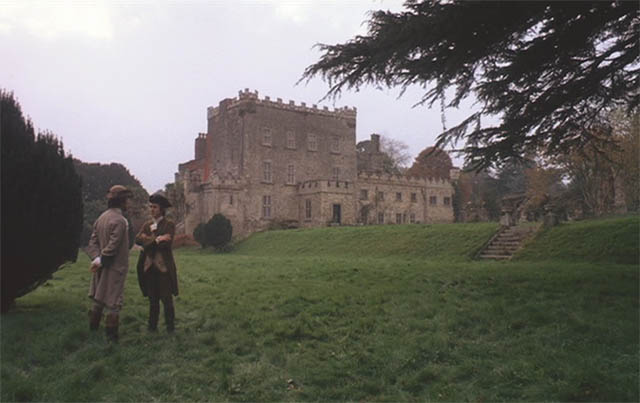

44 MLS of Nora noticing Barry. He continues walking into the shot, approaching the pair. (13:08)
NORA: Redmond. How nice to see you.
In a proprietary fashion he takes her hand and leads her away from Quin.
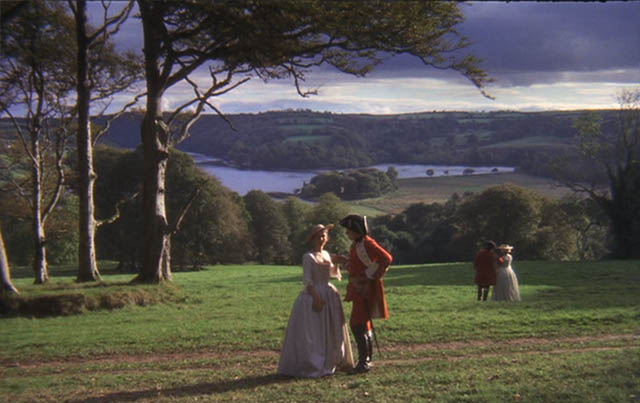
45 MS from the rear of Barry leading Nora away. (13:17)
NORA: Redmond!
BARRY: How could you do this to me, Nora?
NORA: Redmond, in the name of heaven's what's the matter?
46 CU of Quin. (13:27)
NORA (off screen): What are you talking about?
47 MS of Barry and Nora. (13:27)
BARRY: I think this might be an opportune moment to return something to you.
He produces Nora's ribbon.
NORA: Thank you, Redmond. I must have forgotten them somewhere.
BARRY: Yes, you did, Nora.
48 CU of Quin. (13:45)
49 MS of Barry and Nora, she turning to approach Quin. The music ends. (13:48 about)
NORA: Captain Quin, may I have the honor of introducing my cousin, Redmond Barry?
QUIN: Miss Brady, it would appear you have something to...
50 CU of Quin. (13:54)
QUIN: ...discuss in private with this young man. Perhaps it would be best for me to withdraw.
51 CU of Nora. (13:59)
NORA: Captain, I have nothing to discuss with my cousin in private.
52 CU of Quin. (14:02 about)
QUIN: Brady, it would appear you have a great deal to discuss in private.
53 CU Nora. (14:06)
NORA: Good heavens, Captain Quin, he is but a boy and don't signify anything but a parrot...
54 CU Quin. (14:10)
NORA: ...or my lap dog.
QUIN: Oh, indeed. Are you then in the habit of giving intimate articles of your clothing to your parrot or lap dog?
55 CU Nora. (14:18)
NORA: Mayn't I give a bit of ribbon to my own cousin?
56 MS of Quin from beyond Nora's right shoulder. (14:22)
QUIN: You are perfectly welcome, miss. As many yards as you like.
He takes out a blue ribbon from his pocket that he had received from her and displays it.
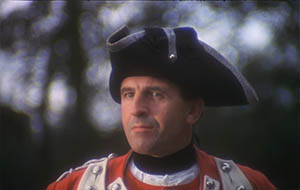 46 |
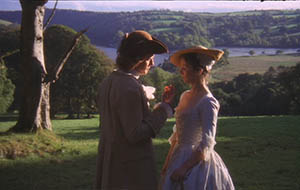 47 |
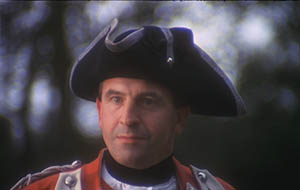 48 |
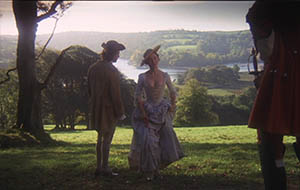 49 |
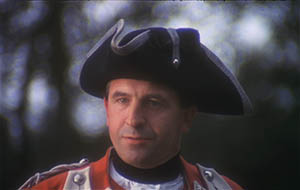 50 |
 51 |
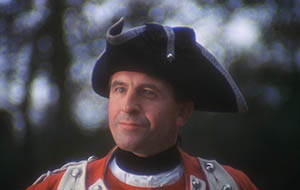 52 |
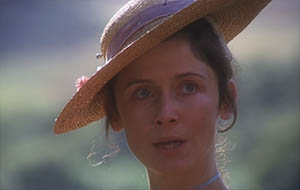 53 |
 54 |
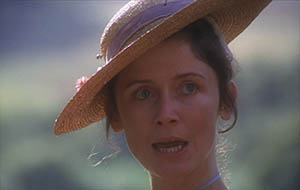 55 |
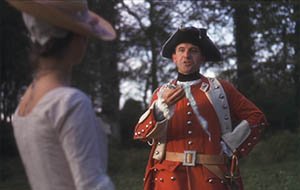 56 |
|
57 LS of Barry, Nora and Quin. (14:25)
QUIN (tossing down the ribbon): When ladies make presents to gentlemen, it is time for other gentlemen to retire. I have the honor to wish you both a good day.
He walks off screen right and one of Nora's brothers follows.
BEARDED BROTHER: Jack Quin! What's the matter here?
QUIN: I'll tell you what it is, sir.
58 MCU of Quin from beyond the brother's right shoulder. (14:40)
QUIN: I've had enough of Miss Brady, here, and your Irish ways. (He says a couple of words, can't tell what, but basically good bye.)
BEARDED BROTHER: What is it?
59 MCU of the brother from Brady's left shoulder, Nora beyond, her other brother and Barry. (14:45)
BEARDED BROTHER: We'll make you used to our Irish ways, or we'll adopt English ones.
60 MCU of Quin from beyond the brother's right shoulder. (14:49)
QUIN: It is not the English way for ladies to have two lovers. And so, Mr. Brady, I'll thank you to pay me the sum you owe me, and I'll resign all claims to this young lady. If she has a fancy for school boys, let her take them, sir.
BEARDED BROTHER: Quin! You're joking!
QUIN: I never was more in earnest.
61 LS of the group, Quin exiting right. (15:05 about)
NORA (chasing after him): John, wait!
The bearded brother and Captain Grogan approach Barry.
BEARDED BROTHER: Fine one, for a meddling brat.
62 CU of Barry from brother's left shoulder. (15:15 about)
BEARDED BROTHER: Your hand is in everybody's pie. What business have you...
63 CU of Nora's brother from Barry's right shoulder. (15:21)
BEARDED BROTHER: ...to come quarreling with a gentleman who has fifteen hundred a year?
64 CU of Barry as the brother stalks off, soon followed by the other brother. (15:25)
 57 |
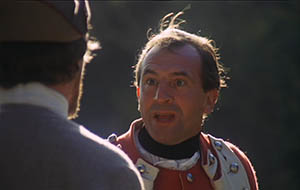 58 |
 59 |
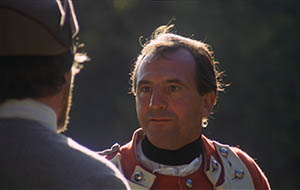 60 |
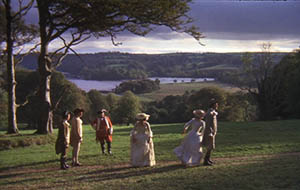 61 |
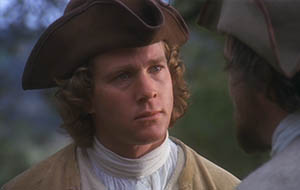 62 |
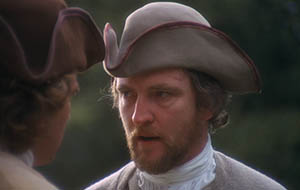 63 |
 64 |
Shots 42 and 44 are stunning as those which behave as paintings, but the shot that really catches me is shot 45 with Capt. Quin standing to the right, just in frame, and that tree pinning down the left of the frame, the lower branch perfectly riding astride the tops of distant trees.
In the book, when Barry and Nora argue over Quin, he leaps their horse into a river and ends up spending a lengthy time in bed recuperating, during which Nora takes the opportunity to acquaint herself with Quin. Kubrick's early screenplay includes this scene and Barry's illness, followed by Barry one day discovering Nora with Quin at the Dugan's, the name Kubrick uses rather than Brady. Kubrick also has Quin going by the name of Best. The dialogue that accompanies Barry's confrontation with Nora and Nora's confrontation with Quin has some differences but is much the same as in the movie.
The confrontation goes as follows in the book.
I am not afraid of any man or ghost; but as I saw that sight my knees fell a-trembling violently under me, and such a sickness came over me, that I was fain to sink down on the grass by a tree against which I leaned, and lost almost all consciousness for a minute or two: then I gathered myself up, and, advancing towards the couple on the walk, loosened the blade of the little silver-hilted hanger I always wore in its scabbard; for I was resolved to pass it through the bodies of the delinquents, and spit them like two pigeons. I don't tell what feelings else besides those of rage were passing through my mind; what bitter blank disappointment, what mad wild despair, what a sensation as if the whole world was tumbling from under me; I make no doubt that my reader hath been jilted by the ladies many times, and so bid him recall his own sensations when the shock first fell upon him.
'No, Norelia,' said the Captain (for it was the fashion of those times for lovers to call themselves by the most romantic names out of novels), 'except for you and four others, I vow before all the gods, my heart has never felt the soft flame!'
'Ah! you men, you men, Eugenio!' said she (the beast's name was John), 'your passion is not equal to ours. We are like—like some plant I've read of—we bear but one flower and then we die!'
'Do you mean you never felt an inclination for another?' said Captain Quin.
'Never, my Eugenio, but for thee! How can you ask a blushing nymph such a question?'
'Darling Norelia!' said he, raising her hand to his lips.
I had a knot of cherry-coloured ribands, which she had given me out of her breast, and which somehow I always wore upon me. I pulled these out of my bosom, and flung them in Captain Quin's face, and rushed out with my little sword drawn, shrieking, 'She's a liar—she's a liar, Captain Quin! Draw, sir, and defend yourself, if you are a man!' and with these words I leapt at the monster, and collared him, while Nora made the air echo with her screams; at the sound of which the other captain and Mysie hastened up.
Although I sprang up like a weed in my illness, and was now nearly attained to my full growth of six feet, yet I was but a lath by the side of the enormous English captain, who had calves and shoulders such as no chairman at Bath ever boasted. He turned very red, and then exceedingly pale at my attack upon him, and slipped back and clutched at his sword—when Nora, in an agony of terror, flung herself round him, screaming, 'Eugenio! Captain Quin, for Heaven's sake spare the child—he is but an infant.'
'And ought to be whipped for his impudence,' said the Captain; 'but never fear, Miss Brady, I shall not touch him; your FAVOURITE is safe from me.' So saying, he stooped down and picked up the bunch of ribands which had fallen at Nora's feet, and handing it to her, said in a sarcastic tone, 'When ladies make presents to gentlemen, it is time for OTHER gentlemen to retire.'
'Good heavens, Quin!' cried the girl; 'he is but a boy.'
'I am a man,' roared I, 'and will prove it.'
'And don't signify any more than my parrot or lap-dog. Mayn't I give a bit of riband to my own cousin?'
'You are perfectly welcome, miss,' continued the Captain, 'as many yards as you like.'
'Monster!' exclaimed the dear girl; 'your father was a tailor, and you are always thinking of the shop. But I'll have my revenge, I will! Reddy, will you see me insulted?'
'Indeed, Miss Nora,' says I, 'I intend to have his blood as sure as my name's Redmond.'
'I'll send for the usher to cane you, little boy,' said the Captain, regaining his self-possession; 'but as for you, miss, I have the honour to wish you a good-day.'
He took off his hat with much ceremony, made a low CONGE, and was just walking off, when Mick, my cousin, came up, whose ear had likewise been caught by the scream.
'Hoity-toity! Jack Quin, what's the matter here?' says Mick; 'Nora in tears, Redmond's ghost here with his sword drawn, and you making a bow?'
'I'll tell you what it is, Mr. Brady,' said the Englishman: 'I have had enough of Miss Nora, here, and your Irish ways. I ain't used to 'em, sir.'
'Well, well! what is it?' said Mick good-humouredly (for he owed Quin a great deal of money as it turned out); 'we'll make you used to our ways, or adopt English ones.'
'It's not the English way for ladies to have two lovers' (the 'Henglish way,' as the captain called it), 'and so, Mr. Brady, I'll thank you to pay me the sum you owe me, and I'll resign all claims to this young lady. If she has a fancy for schoolboys, let her take 'em, sir.'
'Pooh, pooh! Quin, you are joking,' said Mick.
'I never was more in earnest,' replied the other.
'By Heaven, then, look to yourself!' shouted Mick. 'Infamous seducer! infernal deceiver!—you come and wind your toils round this suffering angel here—you win her heart and leave her—and fancy her brother won't defend her? Draw this minute, you slave! and let me cut the wicked heart out of your body!'
'This is regular assassination,' said Quin, starting back; 'there's two on 'em on me at once. Fagan, you won't let 'em murder me?'
'Faith!' said Captain Fagan, who seemed mightily amused, 'you may settle your own quarrel, Captain Quin;' and coming over to me, whispered, 'At him again, you little fellow.'
'As long as Mr. Quin withdraws his claim,' said I, 'I, of course, do not interfere.'
'I do, sir—I do,' said Mr. Quin, more and more flustered.
In both the early screenplay and the book, Barry accosts Quin directly and physically, though not so at this point in the movie.
Kubrick communicates Barry's youth here by the cut of his clothing. It reads as too tight. With an adolescent, it would be a quickly growing boy who in the space of a couple of months finds his clothing is two sizes too small. O'Neal, an adult, comes off as petulant and ridiculous. Had he been wearing appropriately sized clothing he likely wouldn't appear so absurd.
65 LS of a dining hall, numerous people seated at table. (15:30)
Barry enters through the screen right door.
66 LS 3/4 view of table so that we see Nora seated beside Quin, they being served. (15:45)
Barry advances forward, entering screen right and stands before an empty seat opposite Nora.
67 CU of Nora eating soup. She glances up at Barry and down. (15:55)
The music, Sean O Riada - Women of Ireland, begins again.
68 CU of Barry. (16:01)
He looks at Nora then glances to Quin.
69 CU of Quin. (16:06)
70 Return to shot 66. (16:13)
MR. BRADY: Redmond, me boy. Take a seat!
Barry sits.
71 MS 3/4 view of Barry from beyond Quin's left shoulder. (16:23)
72 CU of Quin. (16:36)
He smirks at Barry and drinks.
73 CU of Nora. (16:45)
She drinks as well and dabs her mouth.
74 CU of Barry. (16:53)
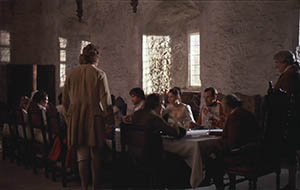 66 |
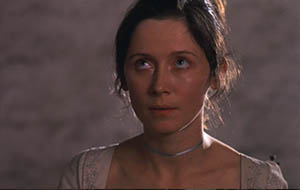 67 |
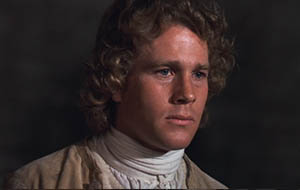 68 |
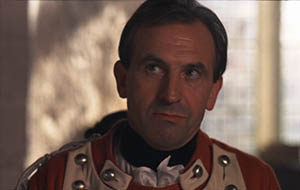 69 |
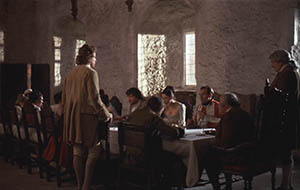 70 |
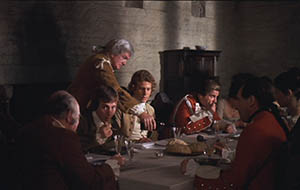 71 |
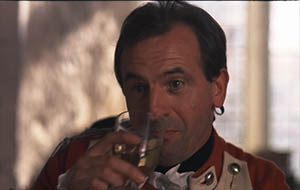 72 |
 73 |
 74 |
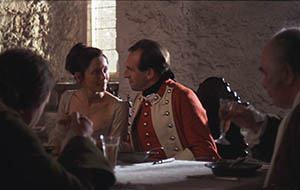 75 |
75 MS 3/4 view of Nora and Quin from beyond Mr. Brady's left shoulder. (16:58)
Quin leans into Nora and says something in a quiet, intimate fashion. He seems to be checking with her if the announcement of their marriage can be made. She agrees. He leans into Mr. Brady and gives him the okay. Mr. Brady rises.
76 LS Mr. Brady from the far end of the table. He taps his glass 3 times. The music ends. (17:18)
MR. BRADY: Mrs. Brady and ladies, if you please. This is the sort of toast...
77 MS Mr. Brady, 3/4 view from his right, the focus going beyond to Barry. (17:32)
MR. BRADY: ...that's drunk a great deal too seldom in my family, and you'll please to receive it with all the honors. (Raising his glass.) Here's to Captain and Mrs. John Quin, and long life!
Everyone reacts enthusiastically, but for Barry. He doesn't exclaim or clap. Quin rises for a bow.
78 MS 3/4 view of Quin and Nora from beyond Mr. Brady. (17:44)
MR. BRADY: Kiss her, Jack, for faith you've got a treasure. Come on, Jack.
Quin rises and kisses Nora.
79 MS Mr. Brady, 3/4 view from his right, the focus going beyond to Barry with the light. (18:00)
MR. BRADY (raising his glass): Here's to a long and happy life together!
GROGAN (rising and drinking toast with others, Barry abstaining): A long and happy life together!
MR. BRADY (Brady and and all sitting after the toast): Redmond...
BARRY (rising): Here is my toast to you, Captain John Quin.
He tosses his drink in Quin's face. Everyone reacts in horror. The glass having shattered on Quin's face, he covers his face with the napkin as he bends toward the camera.
MR. BRADY (rising): Good Lord, Redmond! How dare you behave like that in my house! Mrs. Brady, take the children out. Captain Quin, my dear fellow, are you all right?
Nora takes Quin's hands but he jerks away from her.
80 3/4 view of table and scene from the head left of table. The children and women rush and exit past the camera. (18:50 about)
MR. BRADY: In heaven's name, what does all the row mean?
NORA'S CLEAN-SHAVEN BROTHER: The fact is, sir, the young monkey's...
81 3/4 view of the table and scene from the head right of the table. (18:53)
NORA'S CLEAN-SHAVEN BROTHER: ...fallen in love with Nora. He found herself and the Captain mighty sweet in the garden today and now he's for murdering Jack Quin.
Now he's for murdering Jack Quin.
82 CU Jack Quin whirling toward Brady. (19:00)
QUIN: And I'll tell you what, Mr. Brady, I've been insulted grossly in this house. I'm not at all satisfied with these ways of going on. I'm an Englishman, I am! And I am a man of property! And as for this impudent young swine...
83 3/4 view of the table and scene from the head right of the table. (19:14)
QUIN: ...he should be horsewhipped!
BARRY: Mr. Quin can have satisfaction any time he pleases by calling on Redmond Barry,
Esquire of Barryville.
84 CU of Quin. (19:21)
85 3/4 view of the table and scene from the head right of the table. Barry exits left. (19:22)
GROGAN (rising): I'll see the boy home.
86 CU of Quin. (19:30)
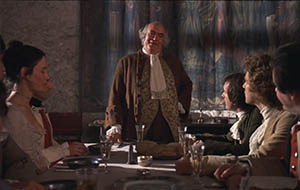 76 |
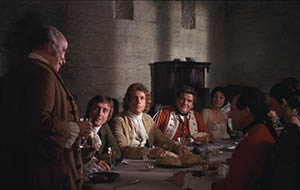 77 |
 78 |
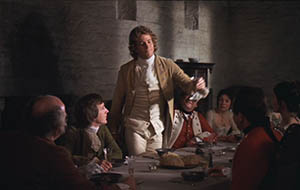 79 |
 80 |
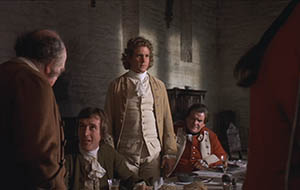 81 |
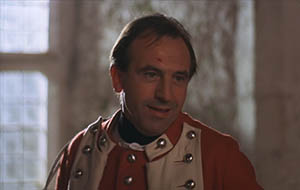 82 |
 83 |
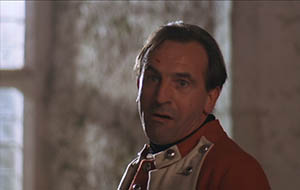 84 |
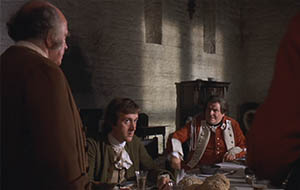 85 |
 86 |
|
Kubrick's early screenplay is often almost taken directly from the book, as with this scene. The movie ends up in being very close to the book and early screenplay, but Barry always is more restrained and not as hot-headed. Not that he isn't fiery here, but he doesn't screech and roar and his cousins are more restrained and don't tackle and strike him. There's not an all out brawl.
At the third toast, it was always the custom for the ladies to withdraw; but my uncle stopped them this time, in spite of the remonstrances of Nora, who said, 'Oh, pa! do let us go!' and said, 'No, Mrs. Brady and ladies, if you plaise; this is a sort of toast that is drunk a great dale too seldom in my family, and you'll plaise to receive it with all the honours. Here's CAPTAIN AND MRS. JOHN QUIN, and long life to them. Kiss her, Jack, you rogue: for 'faith you've got a treasure!'
'He has already '——I screeched out, springing up.
'Hold your tongue, you fool—hold your tongue!' said big Ulick, who sat by me; but I wouldn't hear.
'He has already,' I screamed, 'been slapped in the face this morning, Captain John Quin; he's already been called coward, Captain John Quin; and this is the way I'll drink his health. Here's your health, Captain John Quin!' And I flung a glass of claret into his face. I don't know how he looked after it, for the next moment I myself was under the table, tripped up by Ulick, who hit me a violent cuff on the head as I went down; and I had hardly leisure to hear the general screaming and skurrying that was taking place above me, being so fully occupied with kicks, and thumps, and curses, with which Ulick was belabouring me. 'You fool!' roared he—' you great blundering marplot—you silly beggarly brat' (a thump at each), 'hold your tongue!' These blows from Ulick, of course, I did not care for, for he had always been my friend, and had been in the habit of thrashing me all my life.
When I got up from under the table all the ladies were gone; and I had the satisfaction of seeing the Captain's nose was bleeding, as mine was—HIS was cut across the bridge, and his beauty spoiled for ever. Ulick shook himself, sat down quietly, filled a bumper, and pushed the bottle to me. 'There, you young donkey,' said he, 'sup that; and let's hear no more of your braying.'
'In Heaven's name, what does all the row mean?' says my uncle. 'Is the boy in the fever again?'
'It's all your fault,' said Mick sulkily: 'yours and those who brought him here.'
'Hold your noise, Mick!' says Ulick, turning on him; 'speak civil of my father and me, and don't let me be called upon to teach you manners.'
'It IS your fault,' repeated Mick. 'What business has the vagabond here? If I had my will, I'd have him flogged and turned out.'
'And so he should be,' said Captain Quin.
'You'd best not try it, Quin,' said Ulick, who was always my champion; and turning to his father, 'The fact is, sir, that the young monkey has fallen in love with Nora, and finding her and the Captain mighty sweet in the garden to-day, he was for murdering Jack Quin.'
'Gad, he's beginning young,' said my uncle, quite good-humouredly. ''Faith, Fagan, that boy's a Brady, every inch of him.'
'And I'll tell you what, Mr. B.,' cried Quin, bristling up: 'I've been insulted grossly in this 'OUSE. I ain't at all satisfied with these here ways of going on. I'm an Englishman I am, and a man of property; and I—I'—'If you're insulted, and not satisfied, remember there's two of us, Quin,' said Ulick gruffly. On which the Captain fell to washing his nose in water, and answered never a word.
'Mr. Quin,' said I, in the most dignified tone I could assume, 'may also have satisfaction any time he pleases, by calling on Redmond Barry, Esquire, of Barryville.' At which speech my uncle burst out a-laughing (as he did at everything); and in this laugh, Captain Fagan, much to my mortification, joined. I turned rather smartly upon him, however, and bade him to understand that as for my cousin Ulick, who had been my best friend through life, I could put up with rough treatment from him; yet, though I was a boy, even that sort of treatment I would bear from him no longer; and any other person who ventured on the like would find me a man, to their cost. 'Mr. Quin,' I added, 'knows that fact very well; and if HE'S a man, he'll know where to find me.'
My uncle now observed that it was getting late, and that my mother would be anxious about me. 'One of you had better go home with him,' said he, turning to his sons, 'or the lad may be playing more pranks.' But Ulick said, with a nod to his brother, 'Both of us ride home with Quin here.'
We've empathy for Barry. Though we know his love is ill-conceived, though we know they would be an unhappy pair, an impossible pair, Kubrick's treatment thus far has us sympathetic with him, understanding that he perceives himself as being not rash but dignified, devoted, resolute. What he is also fighting is the determination that he isn't good enough in that he hasn't status or money, which hasn't only to do with class but his youth. We can anticipate future callousness with his being taught by the world how to be false and cynical rather than true to one's heart, how what the heart says means very little in respect to the big equation.
Despite that empathy, Barry may be a little hard to take, even annoying. One wants to tell him to give it up, grow up, and go home.
87 LS of Grogan and Barry walking down a path toward the camera, Grogan leading a horse. As they walk, a church bell rings 8 times. (19:34)
GROGAN: A pretty day's work of it you've made, Master Redmond. Knowing your uncle is distressed for money and trying to break off a match which will bring 1500 a year into the family. Quin has promised to pay off the 4000 pounds which is bothering your uncle. He takes a girl without a penny, a girl that's flinging herself at the head of every man in these parts these five years past, and missing them all! And you, a boy who ought to be attached to your uncle as to your father.
BARRY: And so I am.
GROGAN: And this is the return you make for his kindness? Didn't he harbour you in his house when your father died? Hasn't he given you and your mother, rent free, your fine house...?
BARRY: Mark this, and come what will of it, I will fight the man who pretends the hand of Nora Brady. I'll follow him if it's into the church and fight him there. I'll have his blood, or he'll have mine.
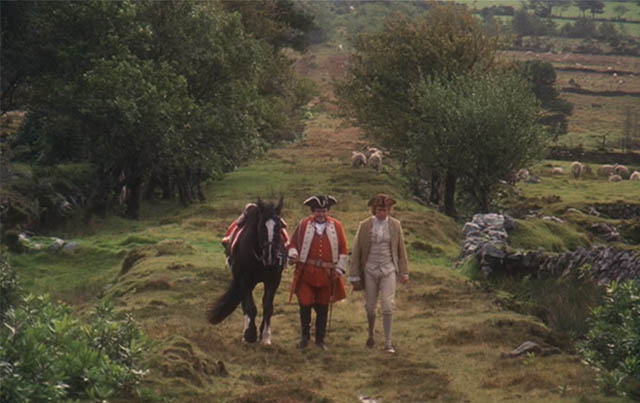
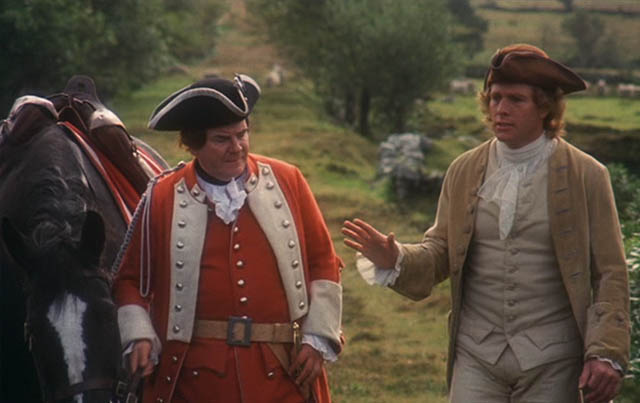
88 MCU of Grogan and Barry. (20:51)
GROGAN: Faith, and I believe ye! I never saw a lad more game in me life. Give me a kiss, me boy. You're after me own soul. As long as Jack Grogan lives, you shall never want a friend or a second.
BARRY: Will you take my message to him? Will you arrange a meeting?
GROGAN: Well, if it must be, it must.
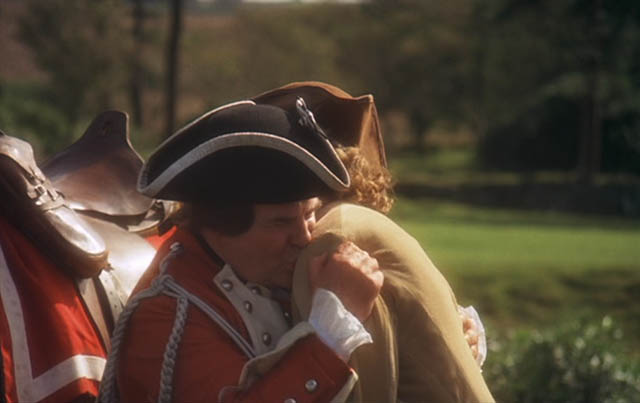
Shot 87 of Grogan walking Barry home visually echoes shot 40 of Barry walking Nora home, the pairs dialoguing as they approach the camera. In the early Kubrick screenplay, this scene is followed by one at Barry's home and his observation on how his mother must have known of the challenge to a duel but kept silent about it, as also had in the book.
From the book.
'A pretty day's work of it you have made, Master Redmond,' said he. 'What! you a friend to the Bradys, and knowing your uncle to be distressed for money, try and break off a match which will bring fifteen hundred a year into the family? Quin has promised to pay off the four thousand pounds which is bothering your uncle so. He takes a girl without a penny—a girl with no more beauty than yonder bullock. Well, well, don't look furious; let's say she IS handsome—there's no accounting for tastes,—a girl that has been flinging herself at the head of every man in these parts these ten years past, and MISSING them all. And you, as poor as herself, a boy of fifteen—well, sixteen, if you insist—and a boy who ought to be attached to your uncle as to your father'—
'And so I am,' said I.—
'And this is the return you make him for his kindness! Didn't he harbour you in his house when you were an orphan, and hasn't he given you rent-free your fine mansion of Barryville yonder? And now, when his affairs can be put into order, and a chance offers for his old age to be made comfortable, who flings himself in the way of him and competence?—You, of all others; the man in the world most obliged to him. It's wicked, ungrateful, unnatural. From a lad of such spirit as you are, I expect a truer courage.'—
'I am not afraid of any man alive,' exclaimed I (for this latter part of the Captain's argument had rather staggered me, and I wished, of course, to turn it—as one always should when the enemy's too strong); 'and it's I am the injured man, Captain Fagan. No man was ever, since the world began, treated so. Look here—look at this riband. I've worn it in my heart for six months. I've had it there all the time of the fever. Didn't Nora take it out of her own bosom and give it me? Didn't she kiss me when she gave it me, and call me her darling Redmond?'—
'She was PRACTISING,' replied Mr. Fagan, with a sneer. 'I know women, sir. Give them time, and let nobody else come to the house, and they'll fall in love with a chimney-sweep. There was a young lady in Fermoy'— —
'A young lady in flames,' roared I (but I used a still hotter word). 'Mark this; come what will of it, I swear I'll fight the man who pretends to the hand of Nora Brady. I'll follow him, if it's into the church, and meet him there. I'll have his blood, or he shall have mine; and this riband shall be found dyed in it. Yes, and if I kill him, I'll pin it on his breast, and then she may go and take back her token.' This I said because I was very much excited at the time, and because I had not read novels and romantic plays for nothing.—
'Well,' says Fagan after a pause, 'if it must be, it must. For a young fellow, you are the most blood-thirsty I ever saw. Quin's a determined fellow, too.'—
'Will you take my message to him?' said I, quite eagerly.
Again, Barry's eagerness for blood is downplayed in the film. Thackery makes a link, which Kubrick does not, between Grogan and the story of the ribbon worn about the heart, which Barry will dip in blood, for Thackery ends the scene remarking on how in six months time Captain Fagan (Grogan in the film) would be dead.
89 CU of pistols being prepared on a table by a lake. As the camera zooms in, music begins, the percussive plucked Sarabande. Sarabande from duel scene. (21:34)
The camera zooms out and pauses so we see Grogan and Nora's clean-shaven brother working on the pistols. It zooms out to an extreme long shot to show Quin with Nora's bearded brother on the right and Barry on the left. They carry a pistol to Quin.
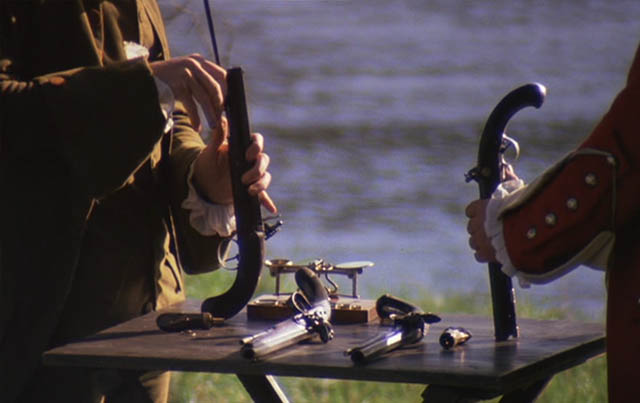
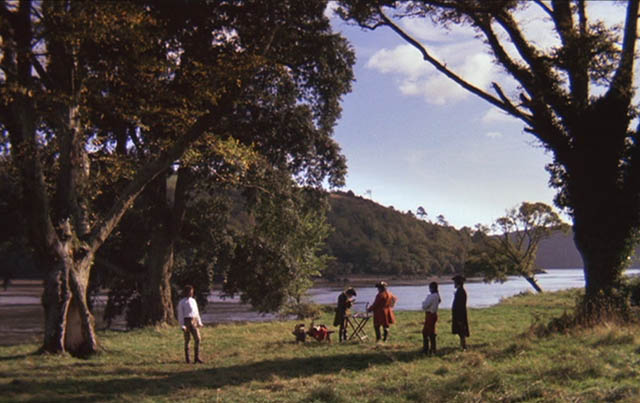
90 MS of Quin taking the pistol from Nora's clean-shaven brother. (22:16)
2nd round of Sarabande begins toward the end of this shot at 22:22.
91 MS of Barry before the lake, Grogan carrying him his pistol. He looks at it, reluctant. (22:25)
GROGAN: Now, look here, Redmond, me boy, this is a silly business. The girl will marry Quin, mark my words. And as sure as she does, you'll forget her. You're but a boy and Quin is willing to consider you as such. Isn't that right, Quin?
92 CU of Quin. (22:52)
QUIN: Hm-hm.
93 Return to MS of Barry before the lake. (22:56)
GROGAN: Now, Dublin's a fine place, and if you've a mind to take a ride there and see the town for a month, here's ten guineas at your service. Will that satisfy you, Captain Quin?
Third round of Saraband begins at "ten guineas" at 23:06.
94 CU of Quin. (23:12)
QUIN: Yes, if Mr. Barry will apologize and go to Dublin, I will consider the whole affair honourably settled.
95 Return to MS of Barry before the lake. (23:19)
NORA'S CLEAN-SHAVEN BROTHER: Say you're sorry, Redmond. Come on, you can easily say that.
96 CU of Quin. (23:35)
BARRY (off camera): I'm not sorry. And I'll not apologize.
97 Return to MS of Barry before the lake. (23:44)
BARRY: And I'd as soon go to Dublin as to hell.
98 CU of Quin. (23:49)
Begin 4th round of Sarabande at 23:50. Bowed instrumentation brought in.
99 Return to MS of Barry before the lake. (23:53)
NORA'S CLEAN-SHAVEN BROTHER: Well then, there's nothing else for it. God bless you, me boy.
BARRY (taking a pistol from Grogan): This isn't one of my pistols.
NORA'S CLEAN-SHAVEN BROTHER: It's all right, it's one of mine. Yours will serve, if it's needed, for the next round. (He exits frame right.)
GROGAN: Good luck, Redmond. (He also exits.)
100 LS of the dueling scene before the lake. (24:22)
NORA'S CLEAN-SHAVEN BROTHER: Gentlemen...
101 LS of Barry and the others from behind Quin. (24:39)
5th round of Sarabande begins at 24:40.
NORA'S CLEAN-SHAVEN BROTHER: ...cock your pistols.
102 CU of Quin, unnerved, attempting to regain his composure. (24:43)
103 MS of Barry cocking his pistol. (24:47)
104 CU of Quin. (24:51)
NORA'S CLEAN-SHAVEN BROTHER: Gentlemen, aim your pistols.
105 LS of the dueling scene. (25:02)
106 CU of Quin. (25:09)
107 CU of Barry. (25:13)
NORA'S CLEAN-SHAVEN BROTHER: One.
108 CU of Quin. (25:18)
NORA'S CLEAN-SHAVEN BROTHER: Two.
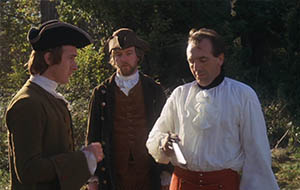 90 |
 91 |
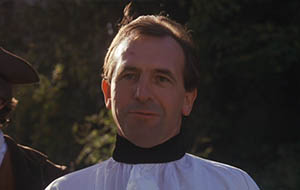 92 |
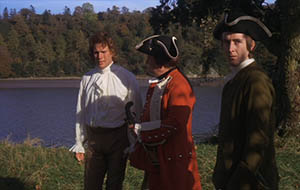 93 |
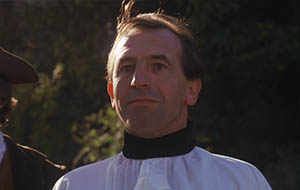 94 |
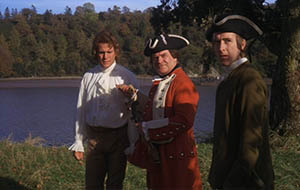 95 |
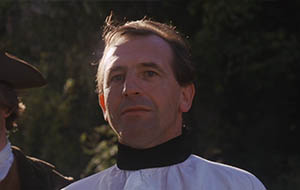 96 |
 97 |
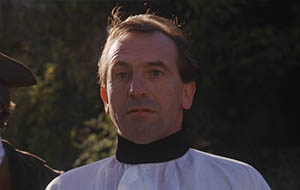 98 |
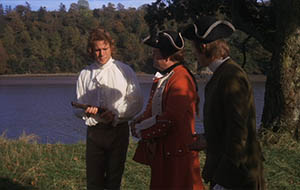 99 |
 100 |
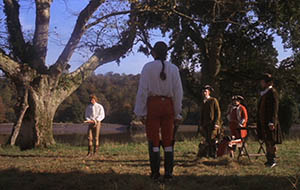 101 |
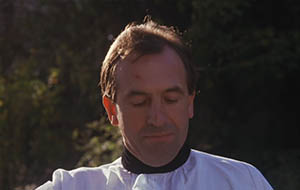 102 |
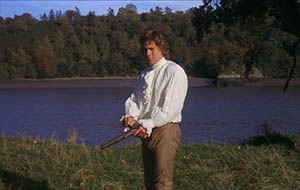 103 |
 104 |
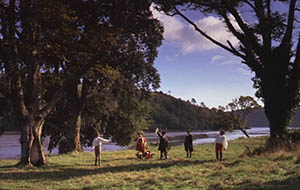 105 |
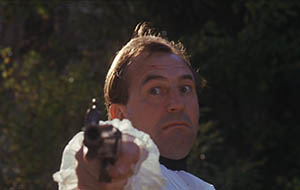 106 |
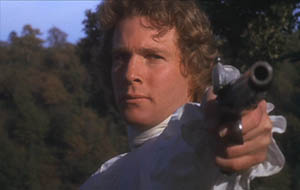 107 |
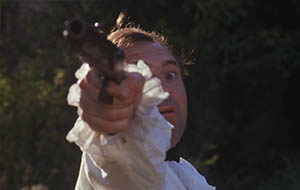 108 |
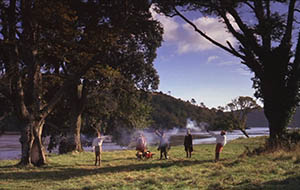 109 |
109 LS of the dueling scene. (25:21)
NORA'S CLEAN-SHAVEN BROTHER: Three.
Barry fires first, Quin second. Quin falls to the ground and the brothers and Grogan rush over to him.
110 MS of Quin lying on the ground, the others gathered around and Barry running over. (25:25)
Harpsichord now takes over the 6th round of the Sarabande at 25:30.
BARRY:
Is he dead?
NORA'S BEARDED BROTHER: Quite dead.
All remove their hats
NORA'S BEARDED BROTHER: This has been a sad day's work for our family, Redmond Barry, and ye've robbed us of 1500 a year. Now you'd better ride off before the police are up. They'd wind of this before we left Kilwangen.
NORA'S CLEAN-SHAVEN BROTHER: Come on, Redmond, I'll go home with you.
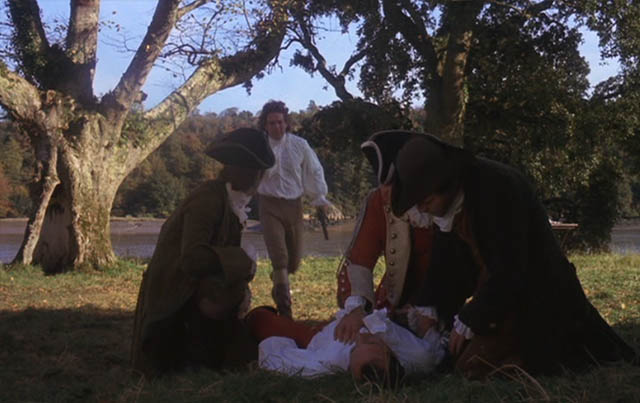
The camera is not as remote from this duel as the one that opens the film.
Preceding this, in the screenplay as in the book, there are scenes of Barry writing a letter that will speak for him should he die, revelation of the fact that he is using his father's pistols in the duel, and his mother's reliance on superstition (sometimes on cards) for foretelling fate, her relief being that when the salt spills it doesn't fall in Barry's direction, which is a good omen.
From the book:
At eleven o'clock Captain Fagan arrived, on horseback, with a mounted dragoon after him. He paid his compliments to the collation which my mother's care had provided for him, and then said, 'Look ye, Redmond my boy; this is a silly business. The girl will marry Quin, mark my words; and as sure as she does you'll forget her. You are but a boy. Quin is willing to consider you as such. Dublin's a fine place, and if you have a mind to take a ride thither and see the town for a month, here are twenty guineas at your service. Make Quin an apology, and be off.'
'A man of honour, Mr. Fagan,' says I, 'dies, but never apologises. I'll see the Captain hanged before I apologise.'
'Then there's nothing for it but a meeting.'
'My mare is saddled and ready,' says I; 'where's the meeting, and who's the Captain's second?'
'Your cousins go out with him,' answered Mr. Fagan.
'I'll ring for my groom to bring my mare round,' I said, 'as soon as you have rested yourself.' Tim was accordingly despatched for Nora, and I rode away, but I didn't take leave of Mrs. Barry. The curtains of her bedroom windows were down, and they didn't move as we mounted and trotted off... BUT TWO HOURS AFTERWARDS, you should have seen her as she came tottering downstairs, and heard the scream which she gave as she hugged her boy to her heart, quite unharmed and without a wound in his body.
What had taken place I may as well tell here. When we got to the ground, Ulick, Mick, and the Captain were already there: Quin, flaming in red regimentals, as big a monster as ever led a grenadier company. The party were laughing together at some joke of one or the other: and I must say I thought this laughter very unbecoming in my cousins, who were met, perhaps, to see the death of one of their kindred.
'I hope to spoil this sport,' says I to Captain Fagan, in a great rage, 'and trust to see this sword of mine in yonder big bully's body.'
'Oh! it's with pistols we fight,' replied Mr. Fagan. 'You are no match for Quin with the sword.'
'I'll match any man with the sword,' said I.
'But swords are to-day impossible; Captain Quin is—is lame. He knocked his knee against the swinging park-gate last night, as he was riding home, and can scarce move it now.'
'Not against Castle Brady gate,' says I: 'that has been off the hinges these ten years.' On which Fagan said it must have been some other gate, and repeated what he had said to Mr. Quin and my cousins, when, on alighting from our horses, we joined and saluted those gentlemen.
'Oh yes! dead lame,' said Ulick, coming to shake me by the hand, while Captain Quin took off his hat and turned extremely red. 'And very lucky for you, Redmond my boy,' continued Ulick; 'you were a dead man else; for he is a devil of a fellow—isn't he, Fagan?'
'A regular Turk,' answered Fagan; adding, 'I never yet knew the man who stood to Captain Quin.'
'Hang the business!' said Ulick; 'I hate it. I'm ashamed of it. Say you're sorry, Redmond: you can easily say that.'
'If the young FELLER will go to DUBLING, as proposed'—here interposed Mr. Quin.
'I am NOT sorry—I'll NOT apologise—and I'll as soon go to DUBLING as to—!' said I, with a stamp of my foot.
'There's nothing else for it,' said Ulick with a laugh to Fagan. 'Take your ground, Fagan,—twelve paces, I suppose?'
'Ten, sir,' said Mr. Quin, in a big voice; 'and make them short ones, do you hear, Captain Fagan?'
'Don't bully, Mr. Quin,' said Ulick surlily; 'here are the pistols.' And he added, with some emotion, to me, 'God bless you, my boy; and when I count three, fire.'
Mr. Fagan put my pistol into my hand,—that is, not one of mine (which were to serve, if need were, for the next round), but one of Ulick's. 'They are all right,' said he. 'Never fear: and, Redmond, fire at his neck—hit him there under the gorget. See how the fool shows himself open.' Mick, who had never spoken a word, Ulick, and the Captain retired to one side, and Ulick gave the signal. It was slowly given, and I had leisure to cover my man well. I saw him changing colour and trembling as the numbers were given. At 'three,' both our pistols went off. I heard something whizz by me, and my antagonist, giving a most horrible groan, staggered backwards and fell.
'He's down—he's down!' cried the seconds, running towards him. Ulick lifted him up—Mick took his head.
'He's hit here, in the neck,' said Mick; and laying open his coat, blood was seen gurgling from under his gorget, at the very spot at which I aimed.
'How is it with you?' said Ulick. 'Is he really hit?' said he, looking hard at him. The unfortunate man did not answer, but when the support of Ulick's arm was withdrawn from his back, groaned once more, and fell backwards.
'The young fellow has begun well,' said Mick, with a scowl. 'You had better ride off, young sir, before the police are up. They had wind of the business before we left Kilwangan.'
'Is he quite dead?' said I.
'Quite dead,' answered Mick.
Barry fights a duel out of love for Nora Brady, but then he doesn't get to be with Nora Brady? He has to flee? Which means we must rearrange our view of Barry's character. Never mind that we later learn Barry hasn't actually killed Quin (we may already suspect this is the case), at this point Barry does believe he has killed Quin and knows he must leave. He always has thus known that should he win the duel he must leave. The duel didn't have so much to do with love as with honor and proving himself, that he was as good as or better than Quin. Barry's a hot head, and no way is he going to let an English officer best him. He's also selfish. As far as he knows, he's deprived Nora's family of Quin's income.
But, then, what are we to expect of a fifteen year old, which is his age in the book. Barry's the same age Alex was in A Clockwork Orange (at least in the book). He's rash. He's inexperienced. He's a self-centered teen with raging hormones and little knowledge of the world. The future is both big and small. He has little concept of it, little to no imagination for it. The future is vast potential while at the same time it has so little meaning to him that he will gamble on being a better shot than this officer and face death. His brain isn't fully developed yet, and if anything gives testament to teens not having fully developed brains it's the history of literature.
111 LS of Redmond and his cousin riding toward the camera. Then it pans left as they pass and we see the front of Barry's mother's home. (26:20)
The Sarabande ends at the beginning of this shot.
NARRATION: How different Barry's fate might have been...
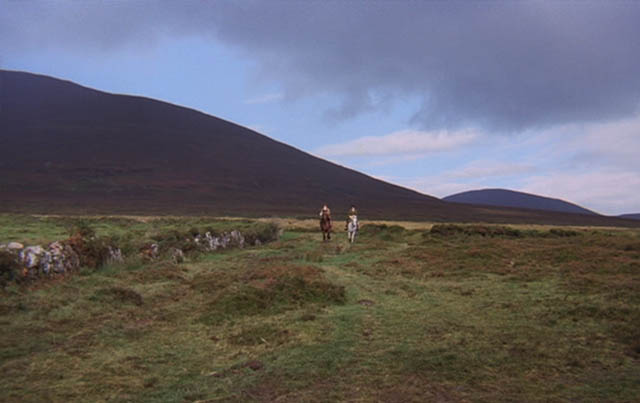
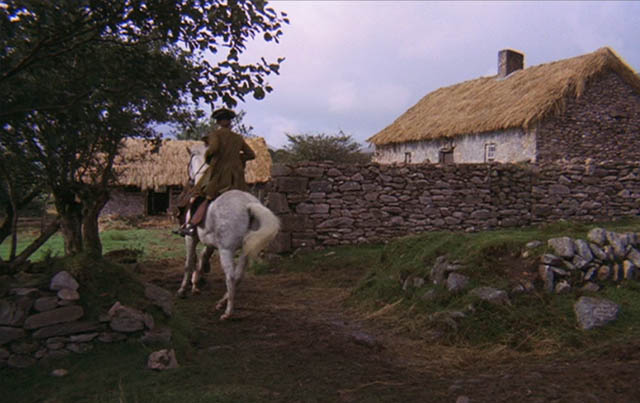
112 MS of Barry and his cousin from the right, profile. He dismounts and hugs his mother who comes running out of her cottage exclaiming at his being alive. (26:36)
NARRATION: ...had he not fallen in love with Nora, and had he not flung the wine in Captain Quin's face. But he was destined to be a wanderer, and the battle with Quin set him on his travels at a very early age, as you shall soon see.
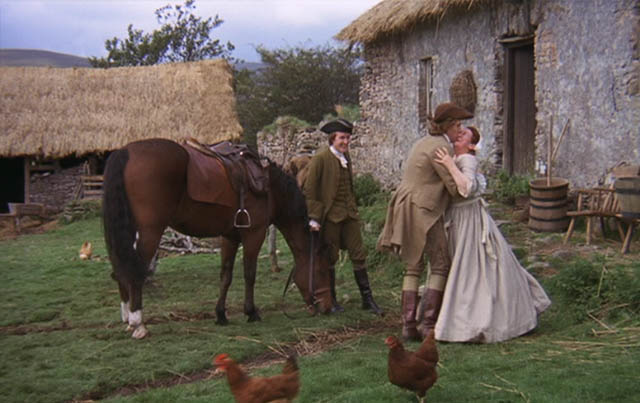
113 MS Barry's cousin, Barry and his mother at table. (26:57)
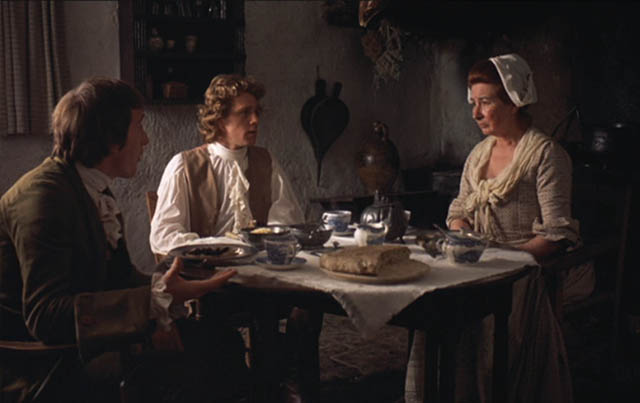
NORA'S CLEAN-SHAVEN BROTHER: The boy must go into hiding, just for a short time, anyway. Dublin is the best place for him to go. He can stay there until matters have blown over.
MRS. BARRY: But the child has never been away from home in his life. Wouldn't he be as safe here as in Dublin?
NORA'S CLEAN-SHAVEN BROTHER: I wish that were true, Aunt Belle, now you know I do, but the Bailiffs may already be on their way from Kilwagen. Now, Dublin is five days ride away from here. There's not a soul who'll know him there. Now, I don't want to harp on unpleasant matters, you know that, but you do know what can happen to him if he's taken.
114 CU Barry. (27:37)
BARRY (kissing his mother's hand): I'll be all right.
115 CU Mrs. Barry. (27:45)
Music begins. The Sea-Maiden.
BARRY (off screen): I'll be all right in Dublin, Mother.
 114 |
 115 |
116 LS from behind of Mrs. Barry and Barry's cousin, Barry in the distance, riding away from the camera. (27:65)
He waves goodbye.
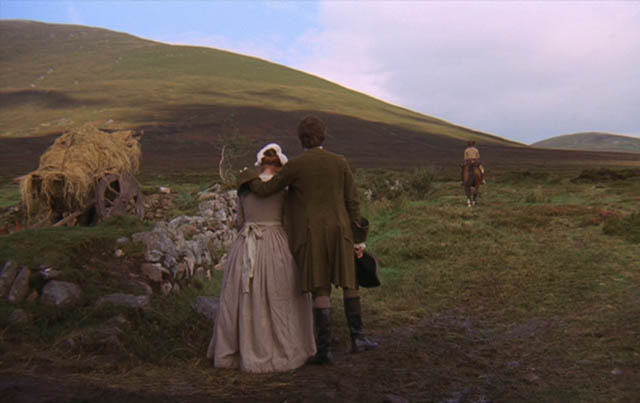
117 MS of Mrs. Barry and Barry's cousin. (28:05)
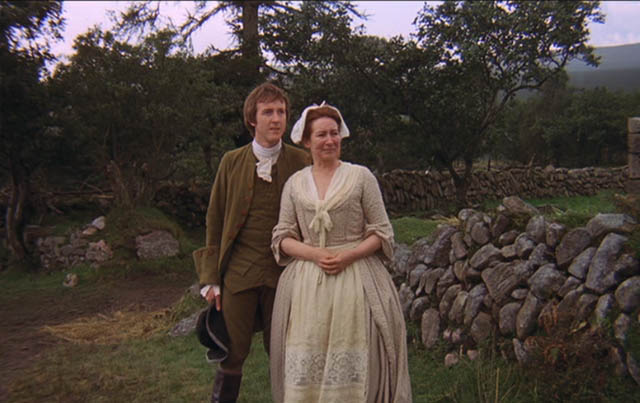
118 LS of Barry, from behind, riding away. (28:09)
He turns right, mid-distance, and rides off camera to the right.
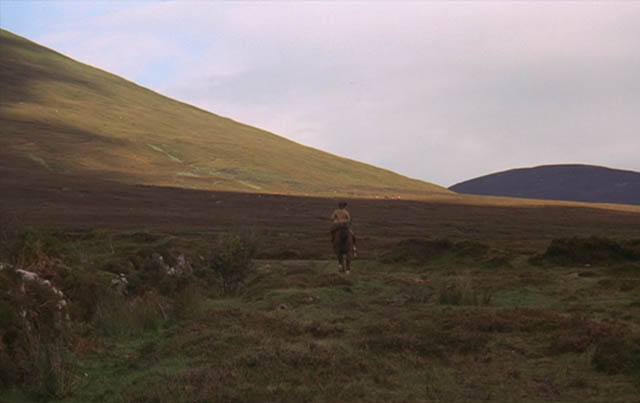
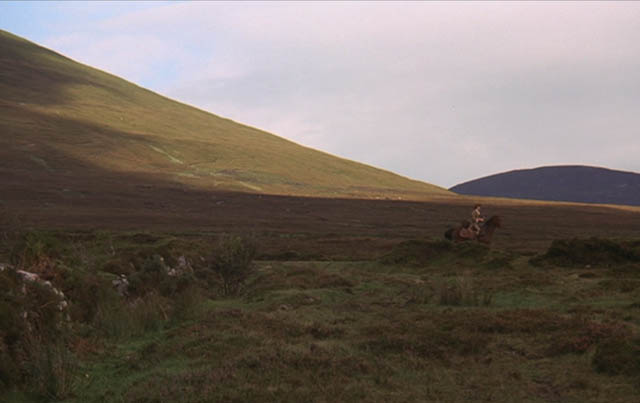
We've had two previous scenes at the Barry home, the one immediately following the opening in which his father was killed, the scene in which he chopped wood, and now this one which follows after his own duel, in which we have the mother who has lived for her son about to be separated from him.
From the book:
I need not tell how great were her pride and exultation when she heard from Ulick's lips the account of my behaviour at the duel. He urged, however, that I should go into hiding for a short time; and it was agreed between them that I should drop my name of Barry, and, taking that of Redmond, go to Dublin, and there wait until matters were blown over. This arrangement was not come to without some discussion; for why should I not be as safe at Barryville, she said, as my cousin and Ulick at Castle Brady?—bailiffs and duns never got near THEM; why should constables be enabled to come upon me? But Ulick persisted in the necessity of my instant departure; in which argument, as I was anxious to see the world, I must confess, I sided with him; and my mother was brought to see that in our small house at Barryville, in the midst of the village, and with the guard but of a couple of servants, escape would be impossible. So the kind soul was forced to yield to my cousin's entreaties, who promised her, however, that the affair would soon be arranged, and that I should be restored to her. Ah! how little did he know what fortune was in store for me!
My dear mother had some forebodings, I think, that our separation was to be a long one; for she told me that all night long she had been consulting the cards regarding my fate in the duel: and that all the signs betokened a separation; then, taking out a stocking from her escritoire, the kind soul put twenty guineas in a purse for me (she had herself but twenty-five), and made up a little valise, to be placed at the back of my mare, in which were my clothes, linen, and a silver dressing-case of my father's. She bade me, too, to keep the sword and the pistols I had known to use so like a man. She hurried my departure now (though her heart, I know, was full), and almost in half-an-hour after my arrival at home I was once more on the road again, with the wide world as it were before me.
Shot 118 is magnificent, Barry riding away from the camera and then taking a hard right. If you watch carefully, the clouds follow him across the screen from left to right. Beautifully caught. One feels fate in steady pursuit of Barry Lyndon.
Approx 15,900 words or 31 single-spaced pages. A 122 minute read at 130 wpm.
Next: Barry Lyndon Analysis - Part 2
Go to Table of Contents for Analysis of "Barry Lyndon"
Link to the main TOC page for all the analyses